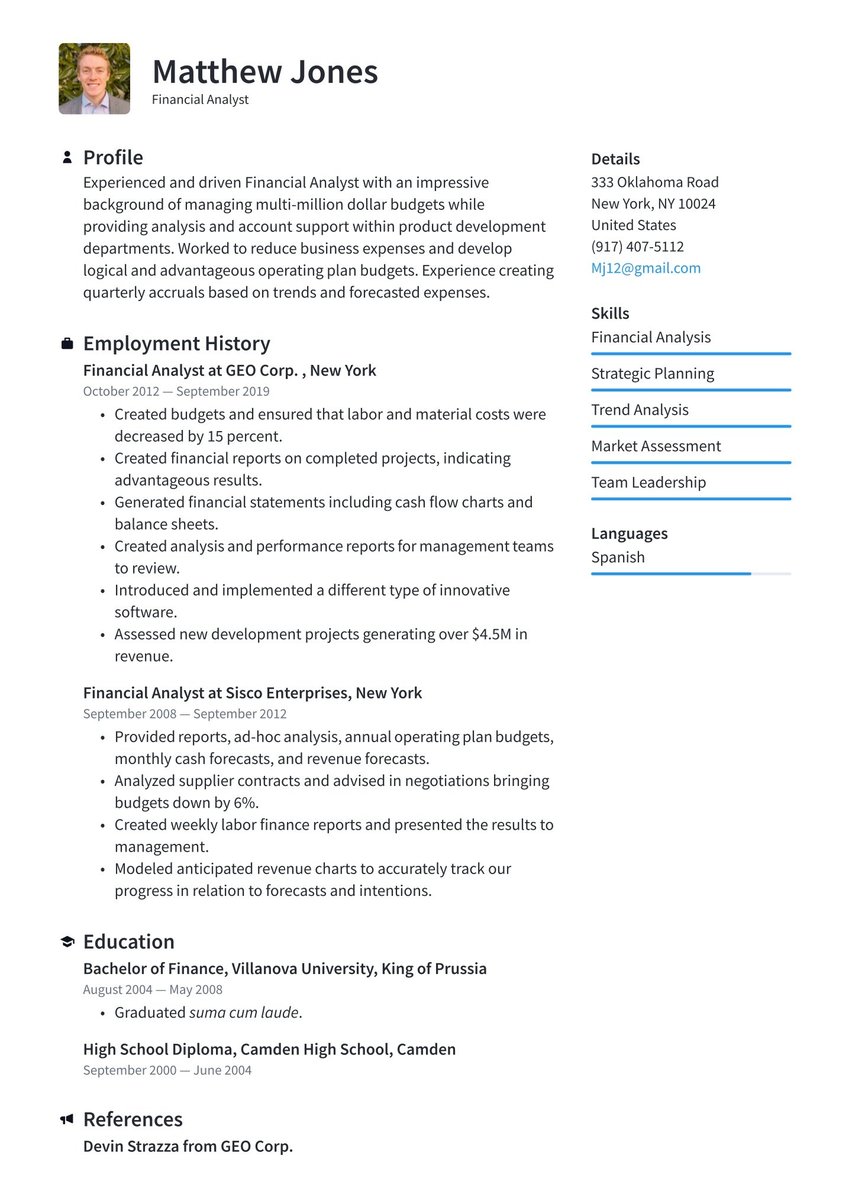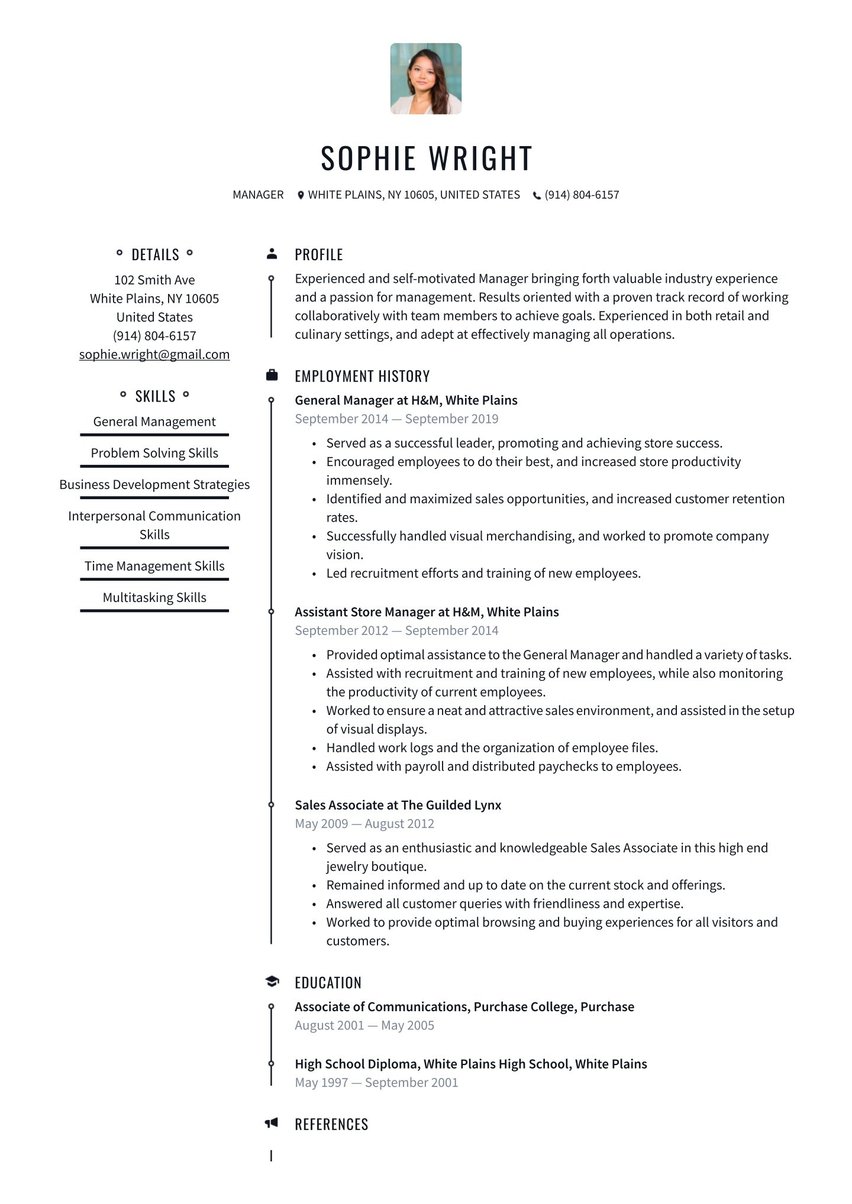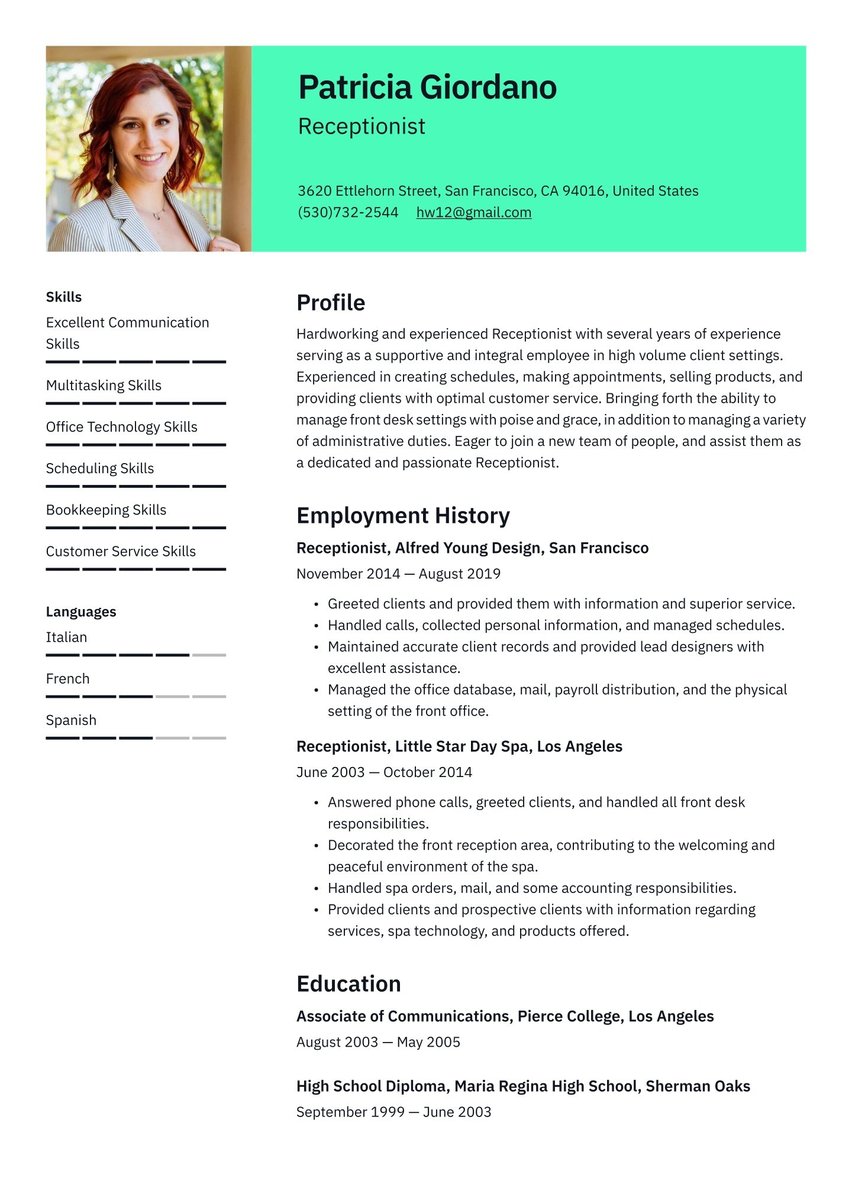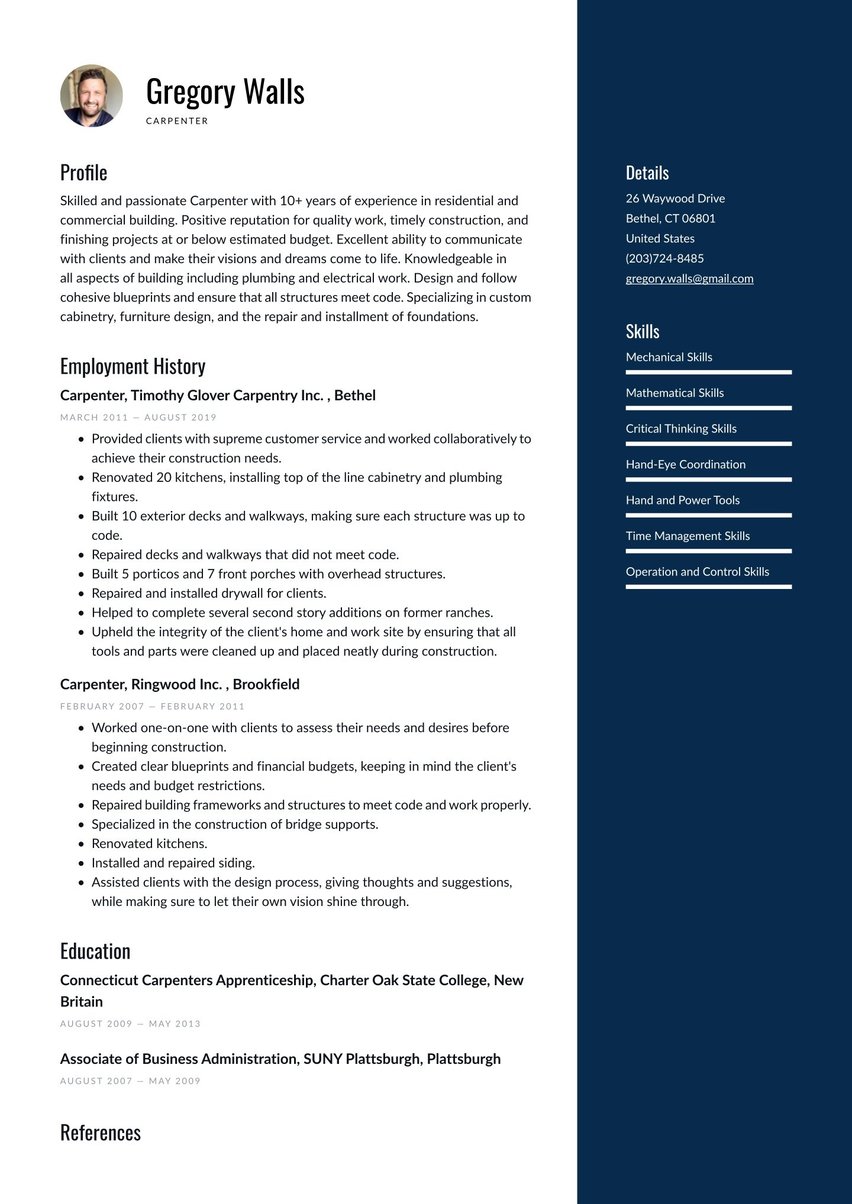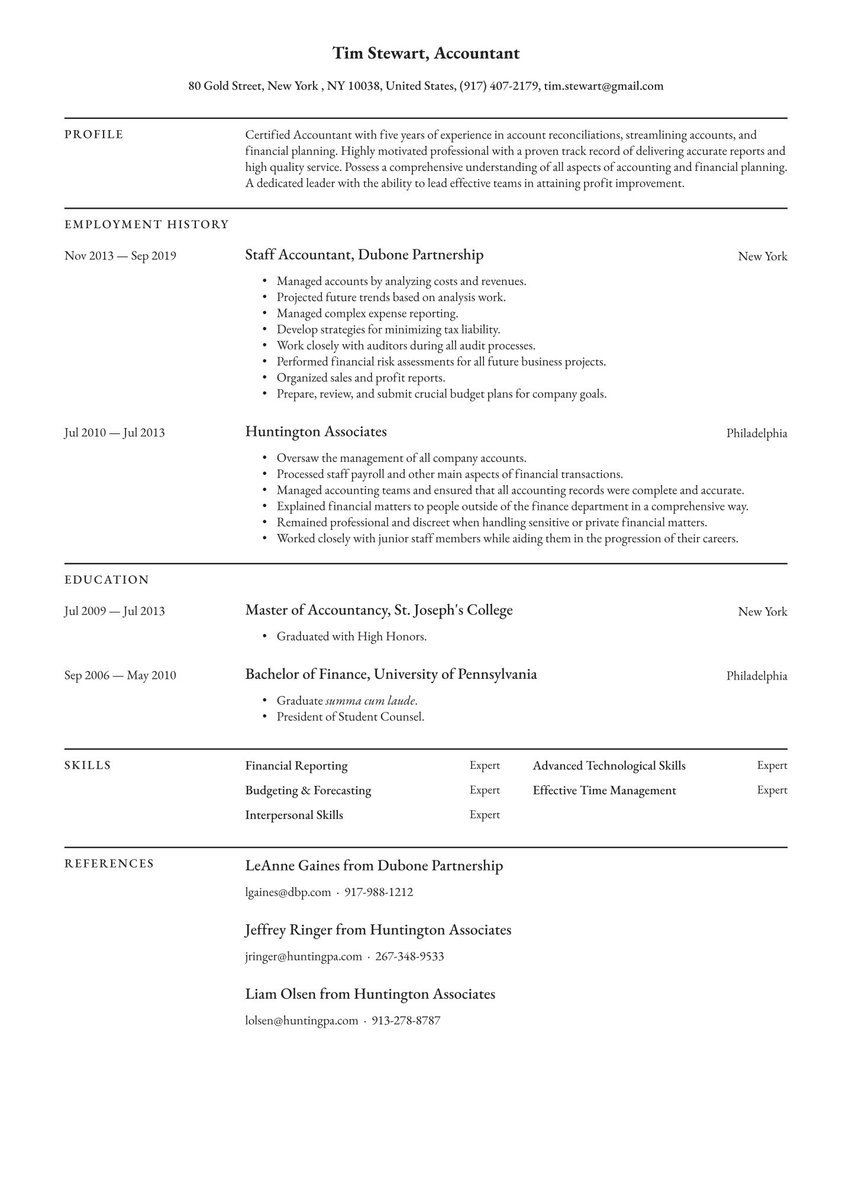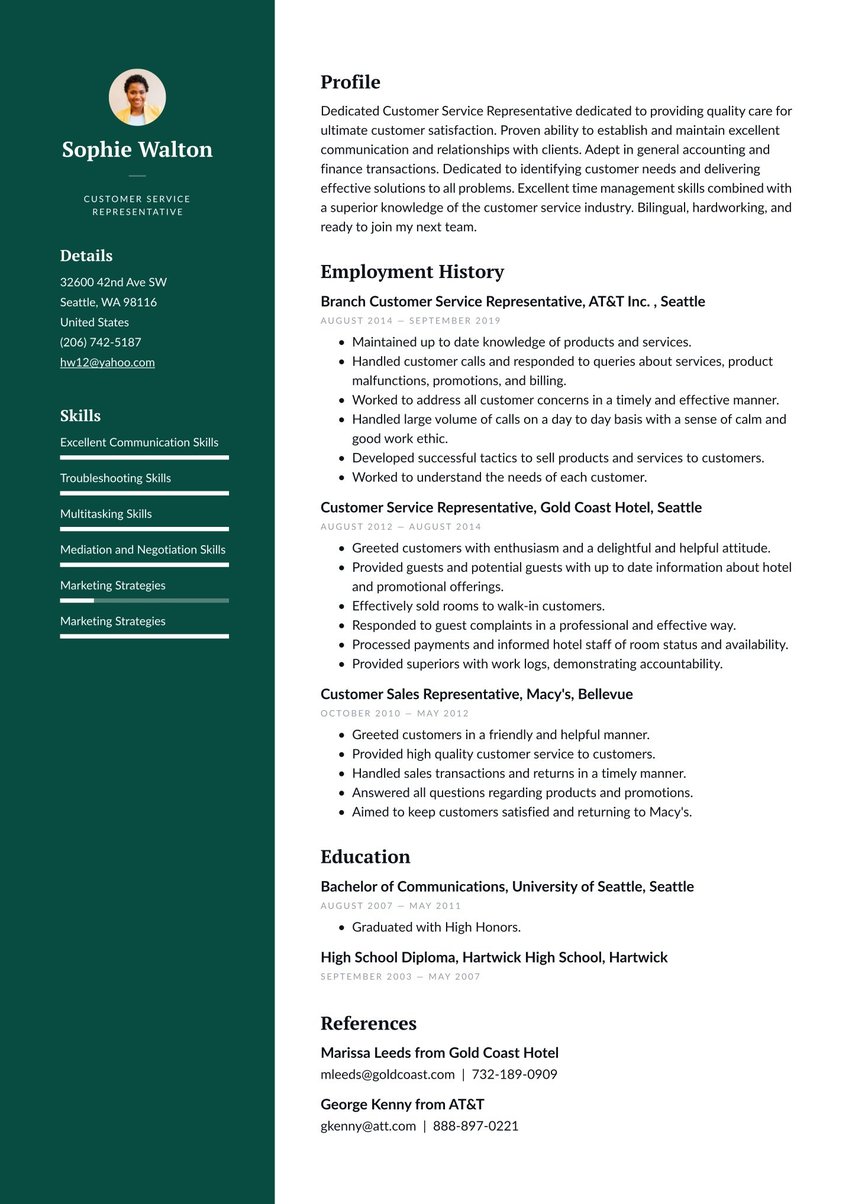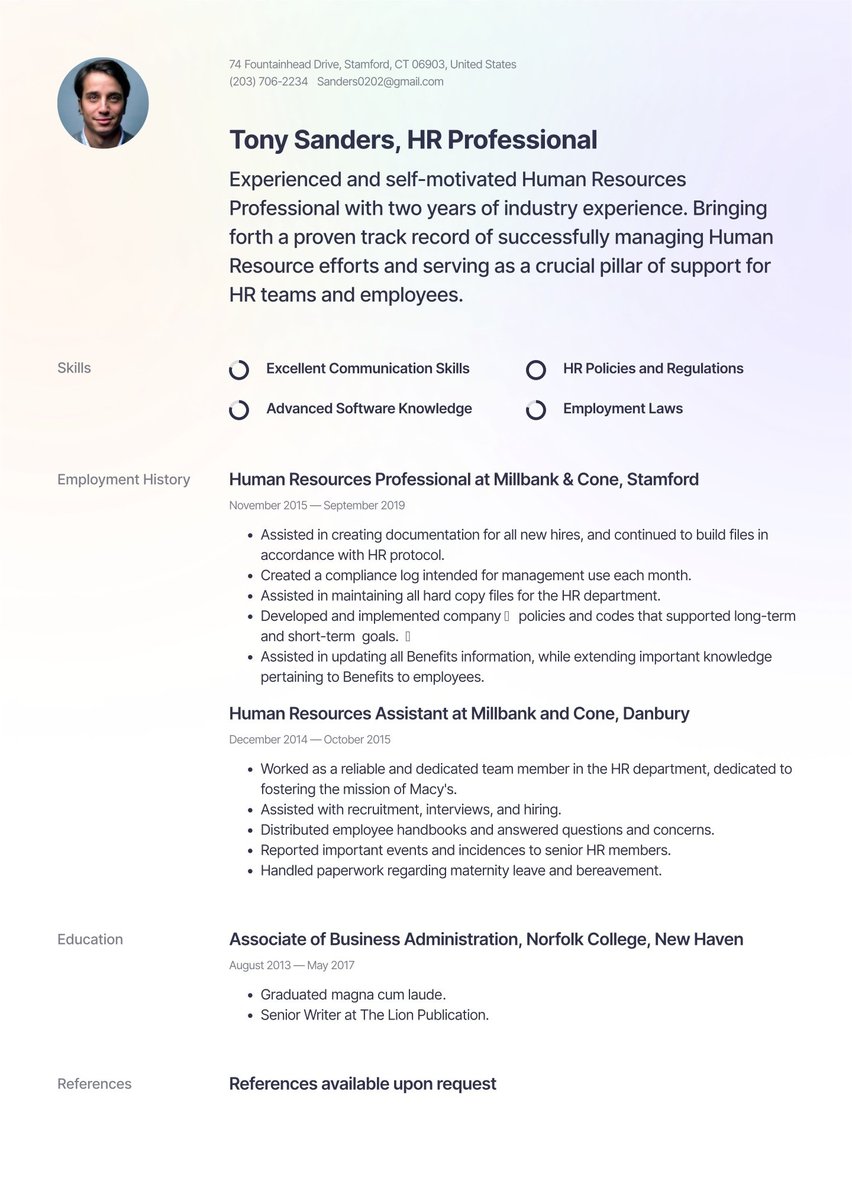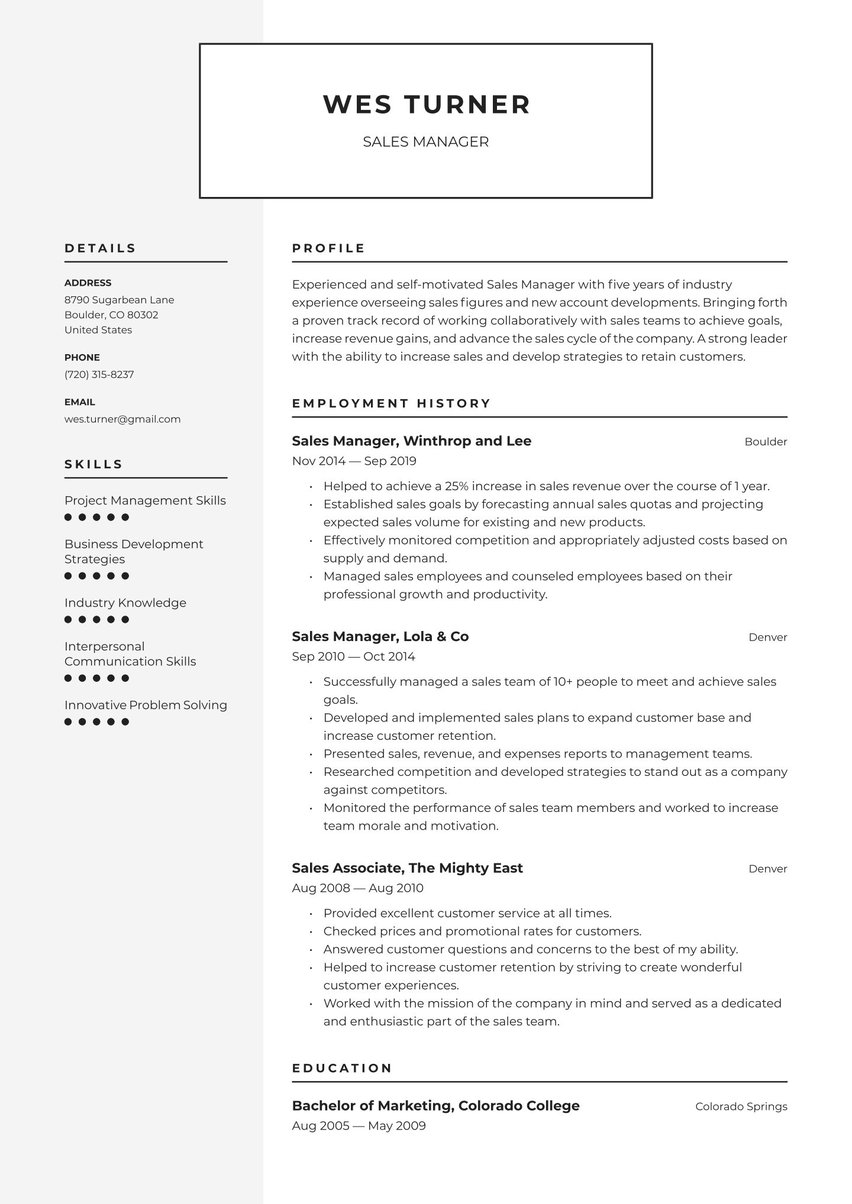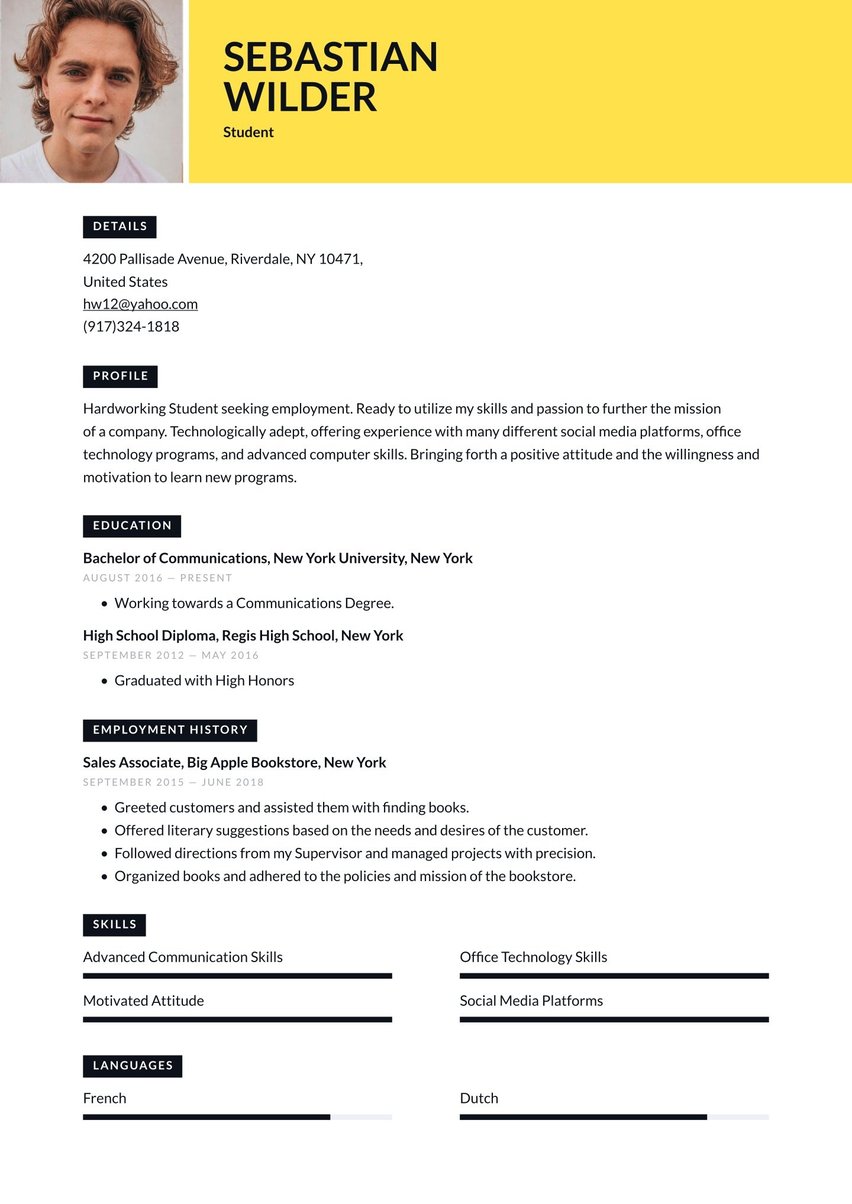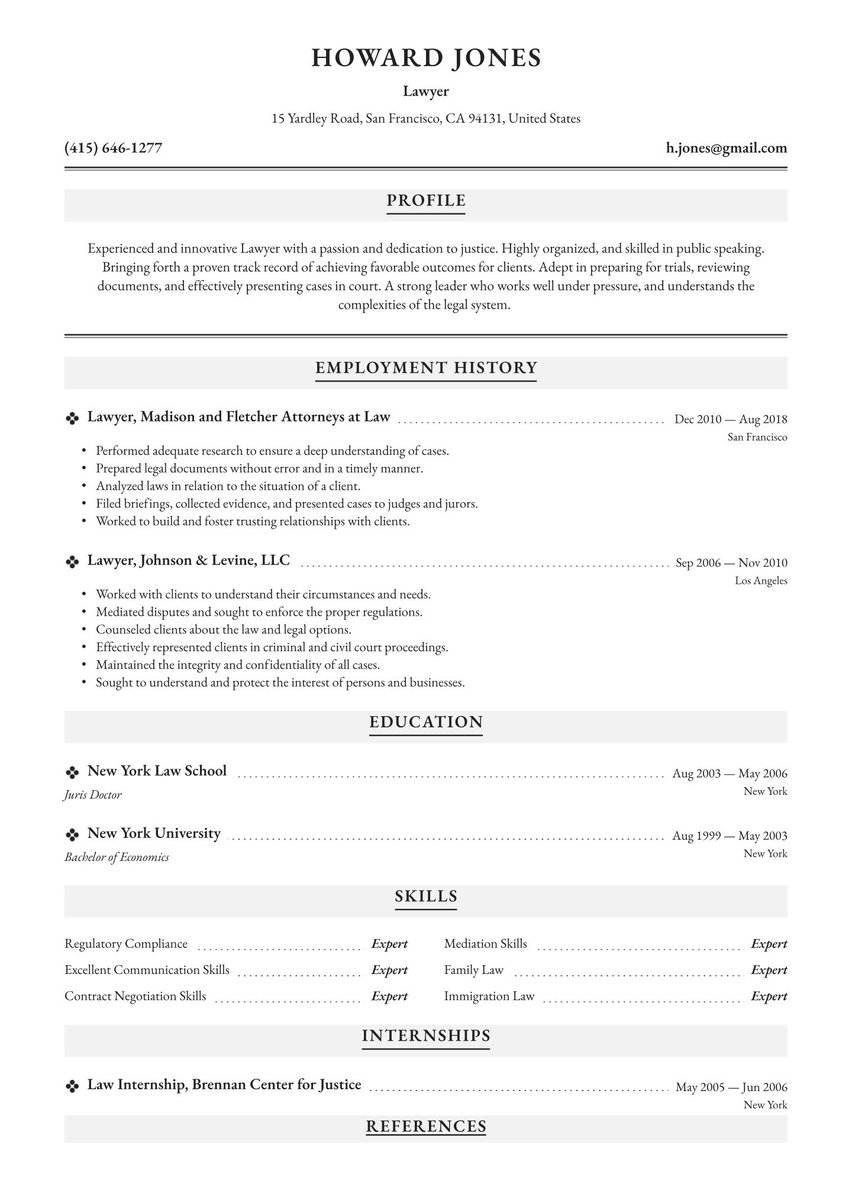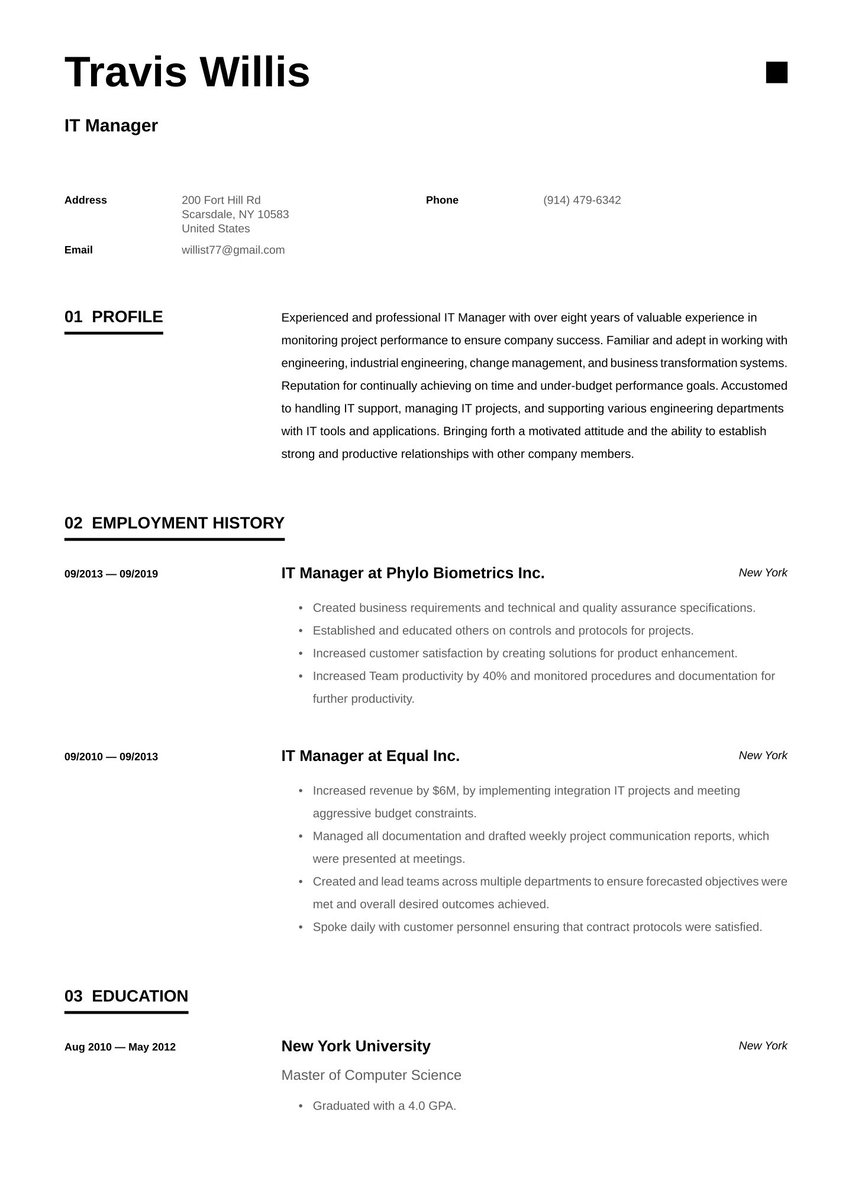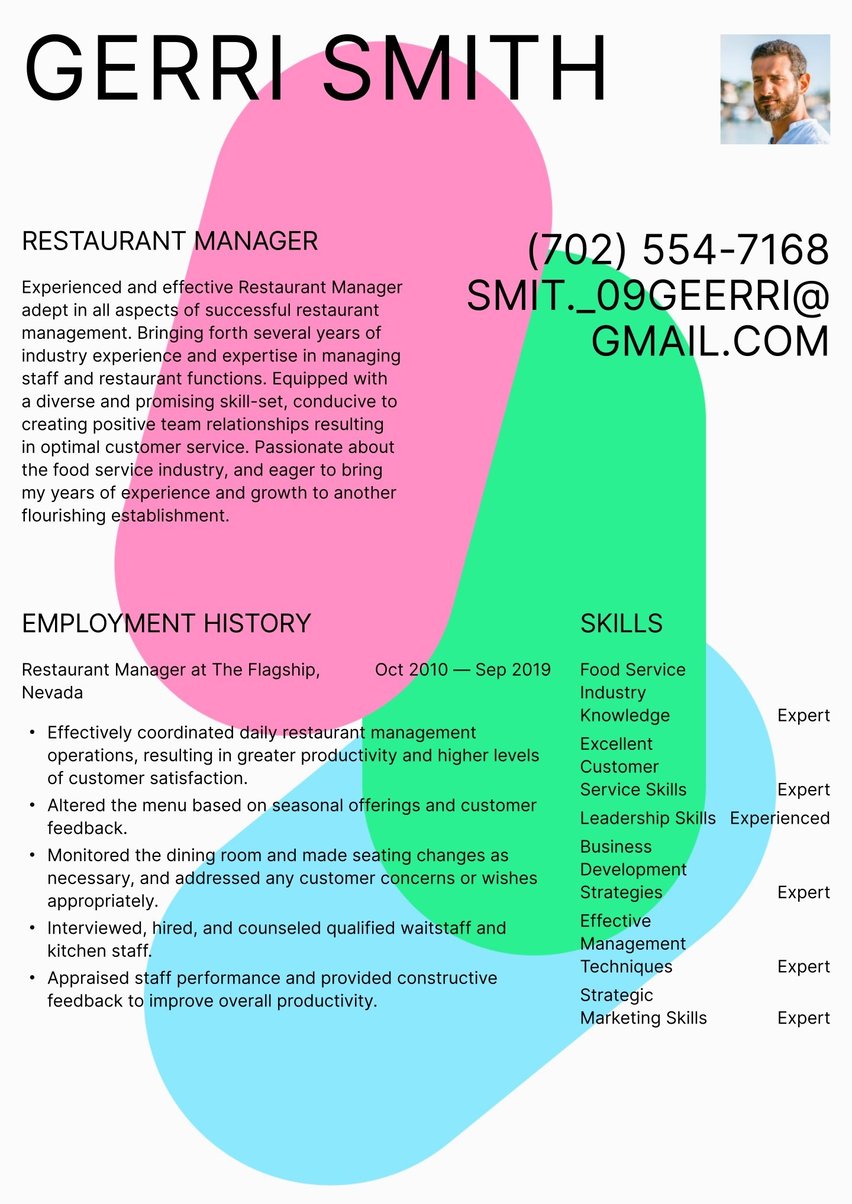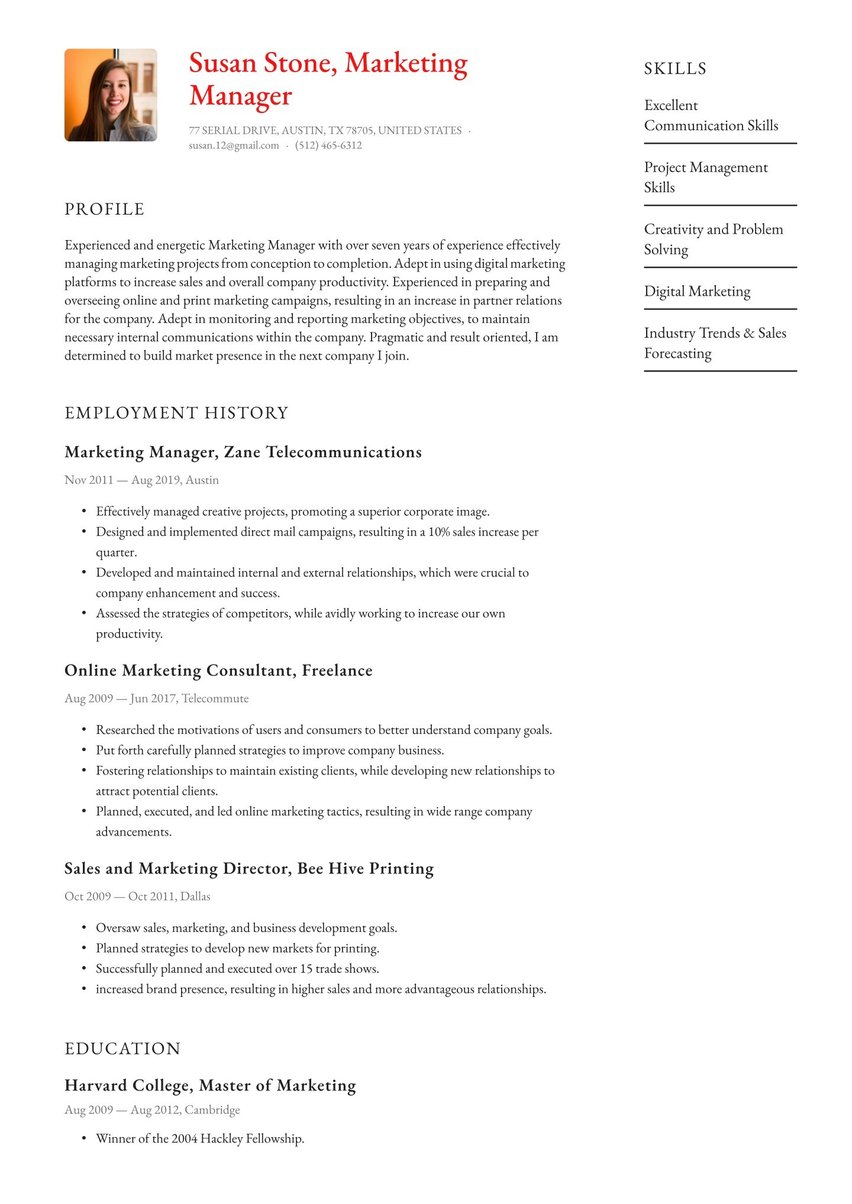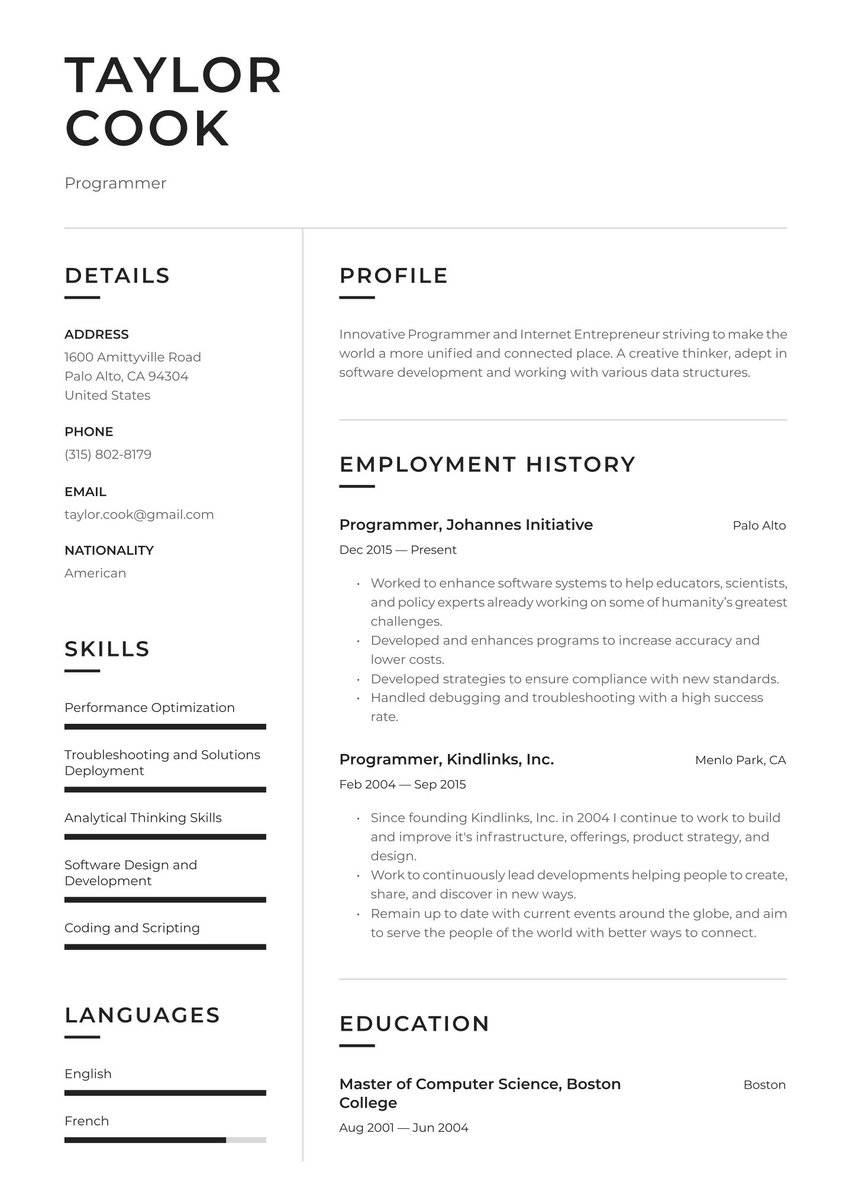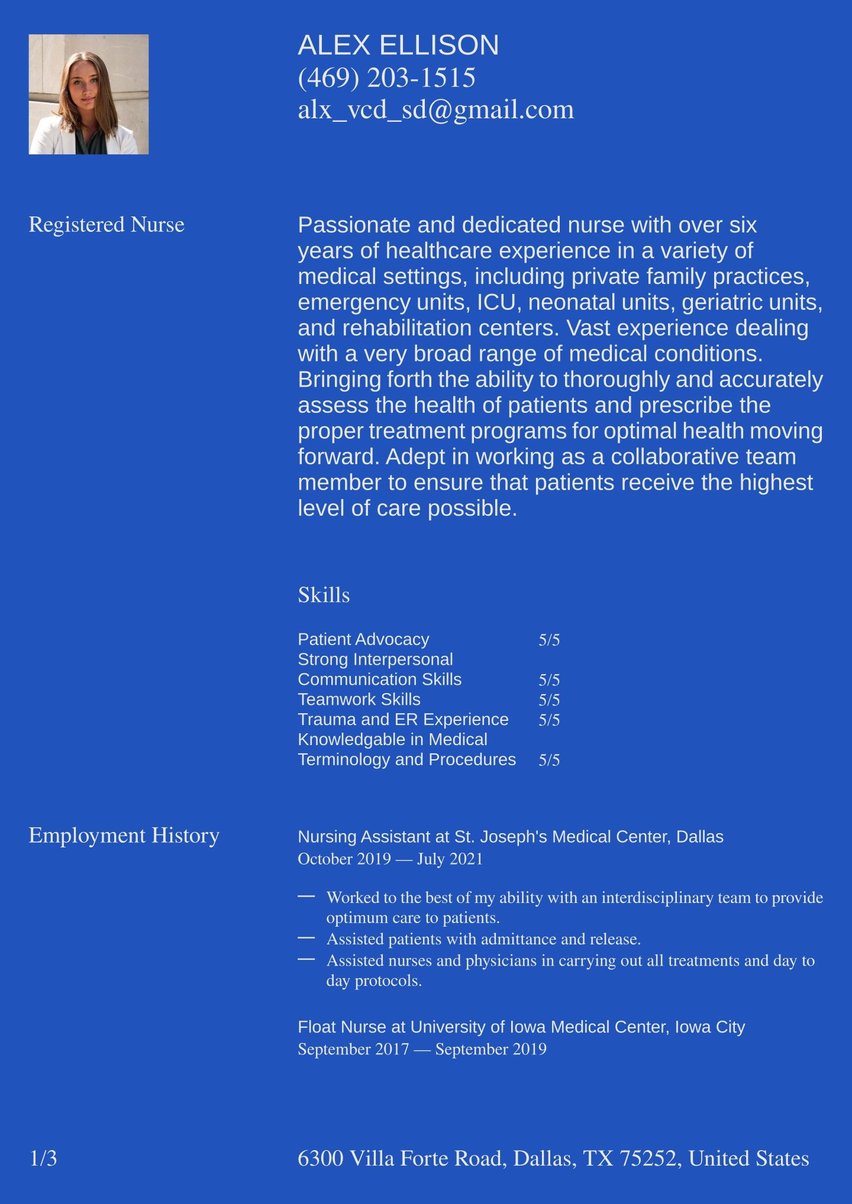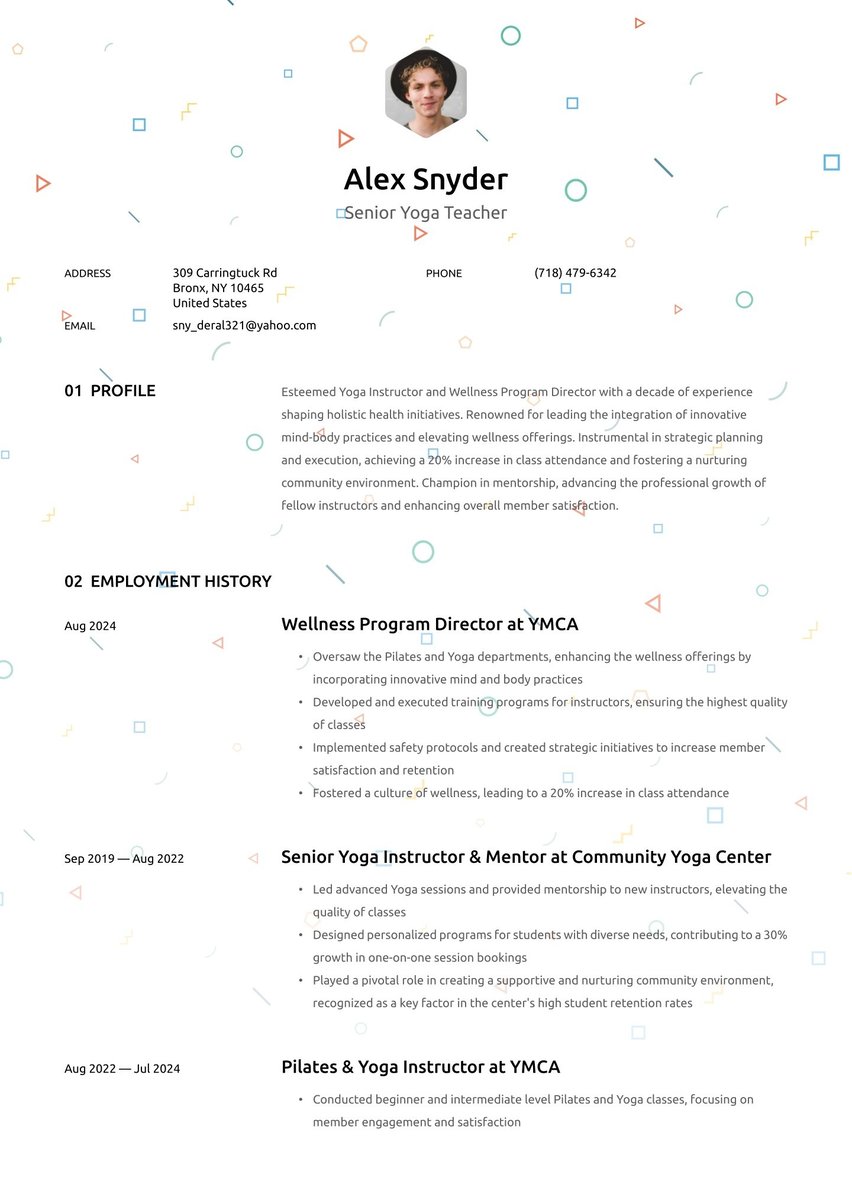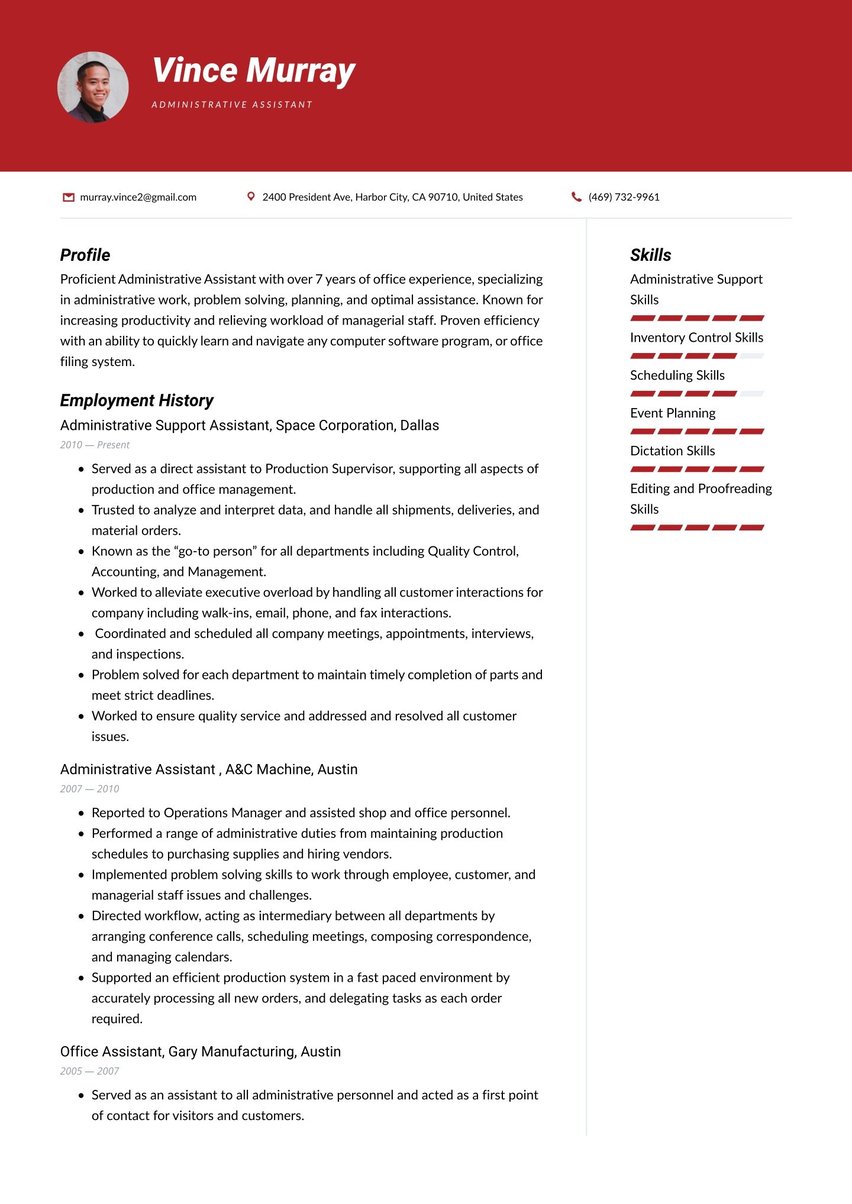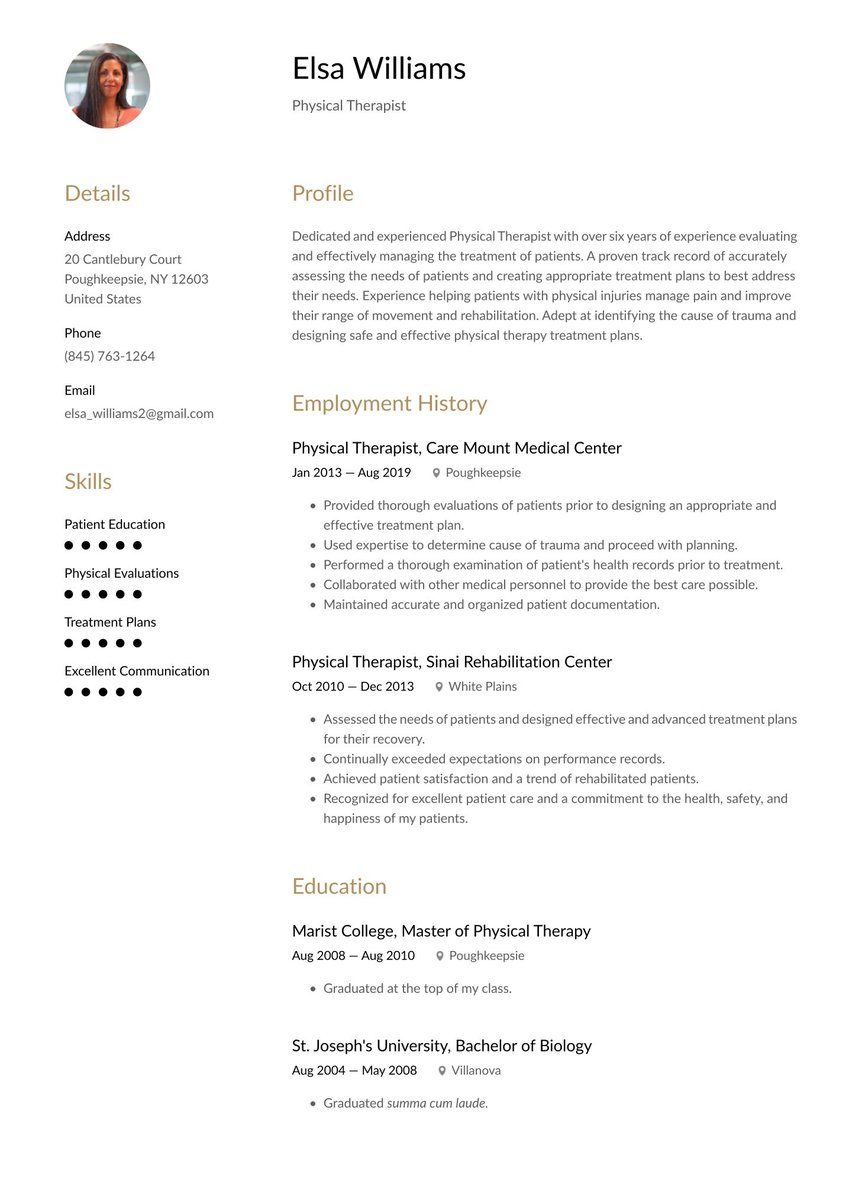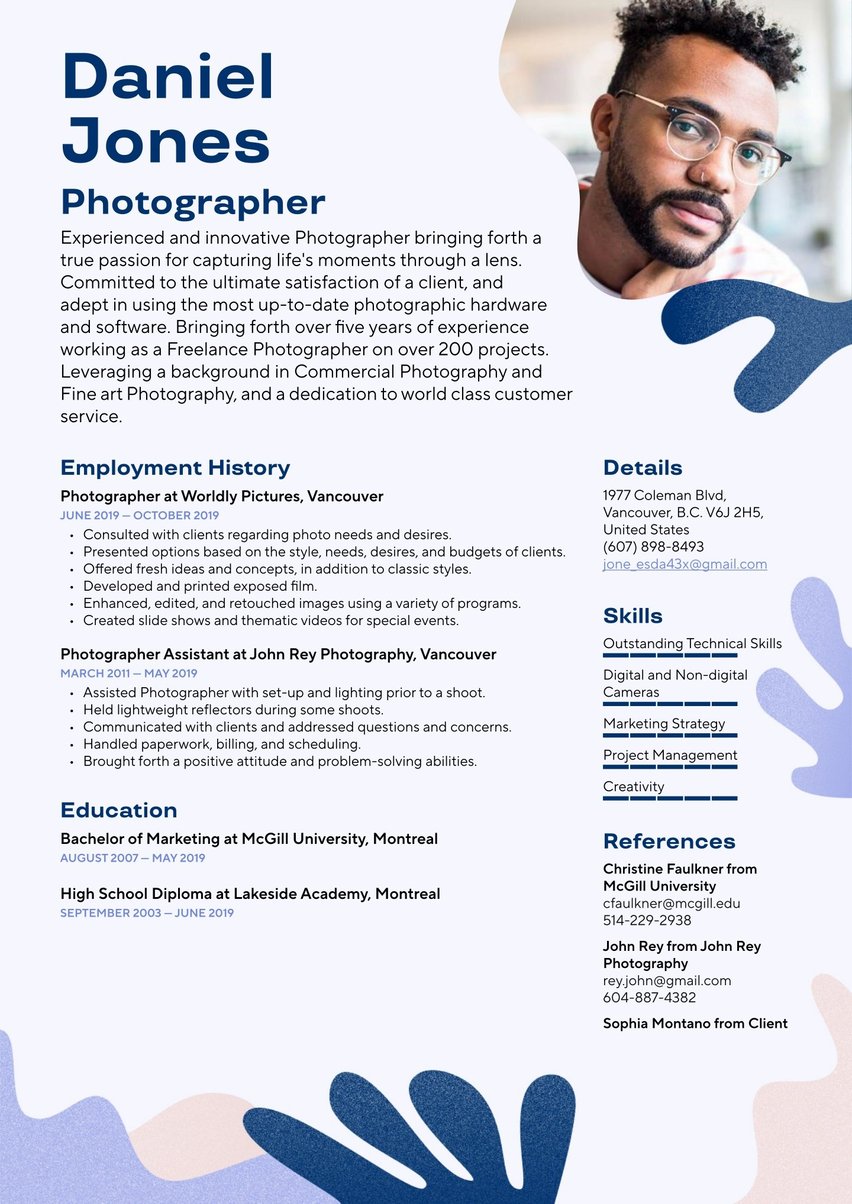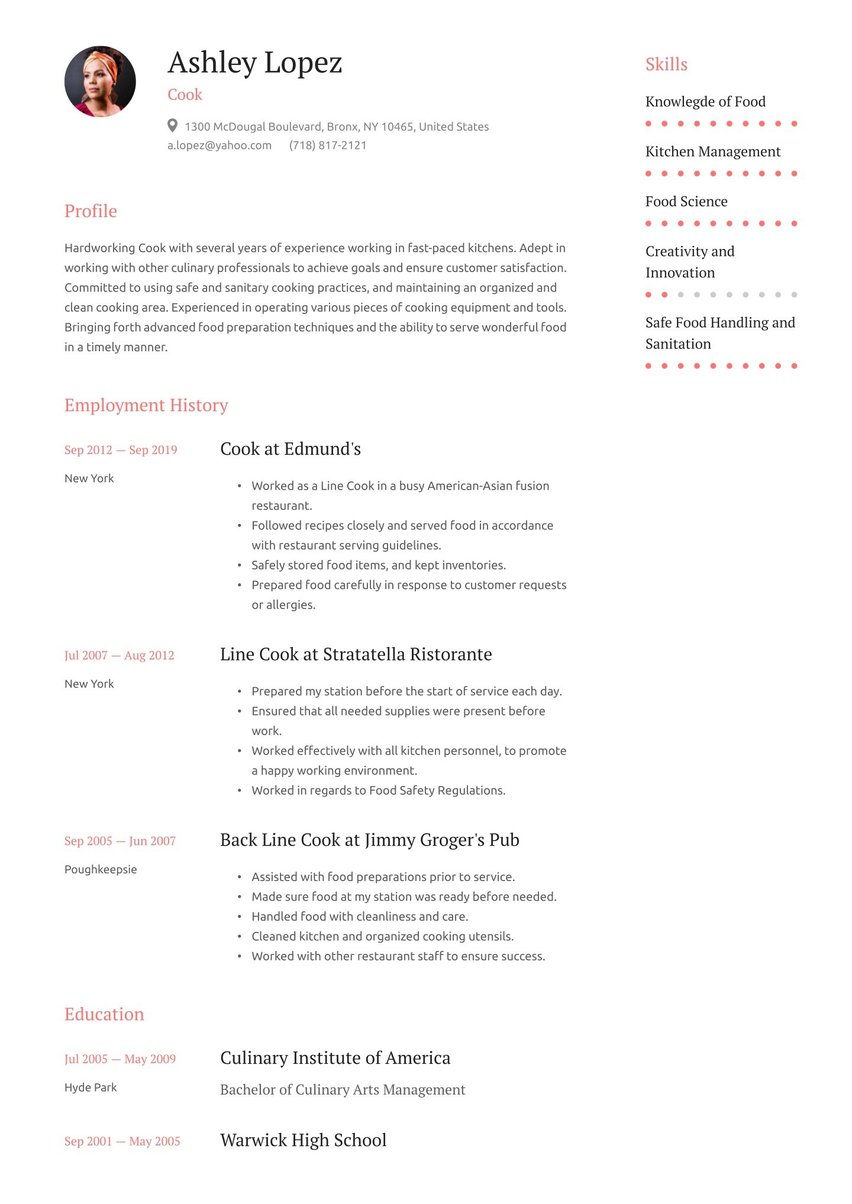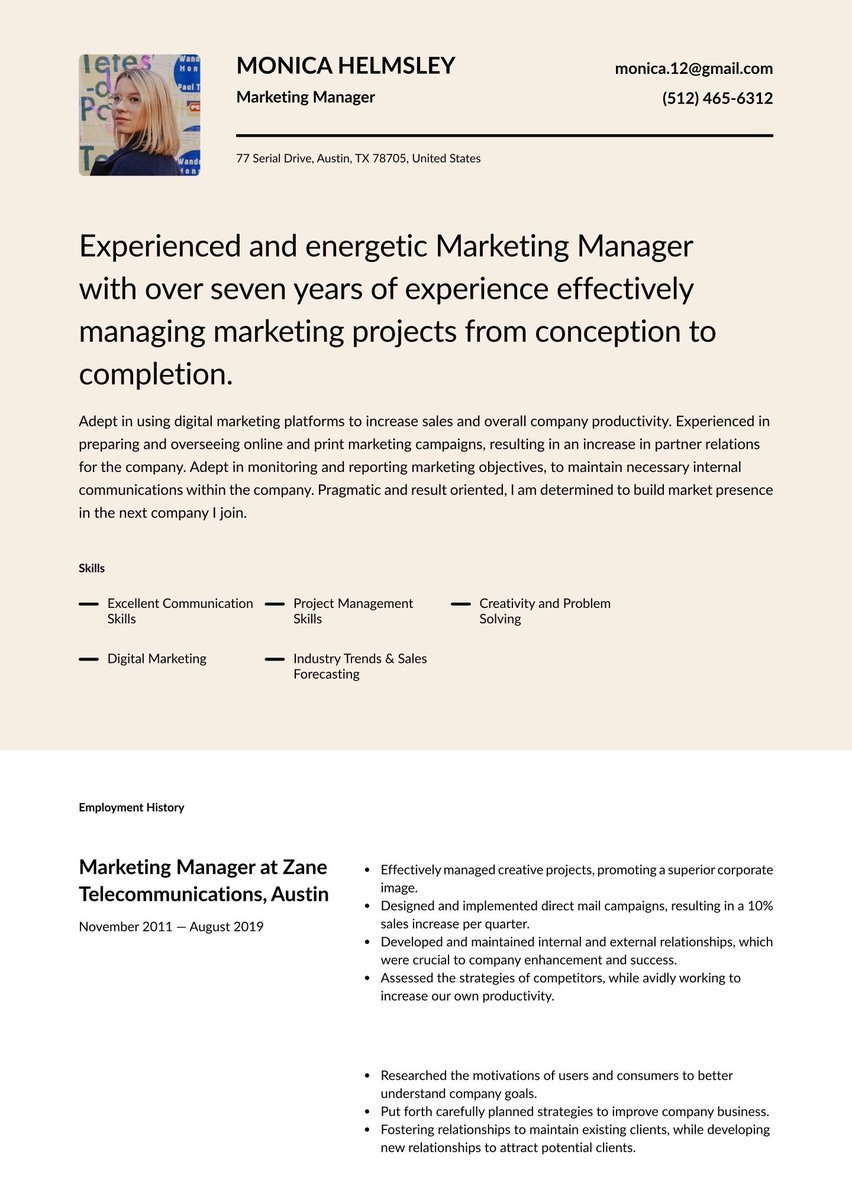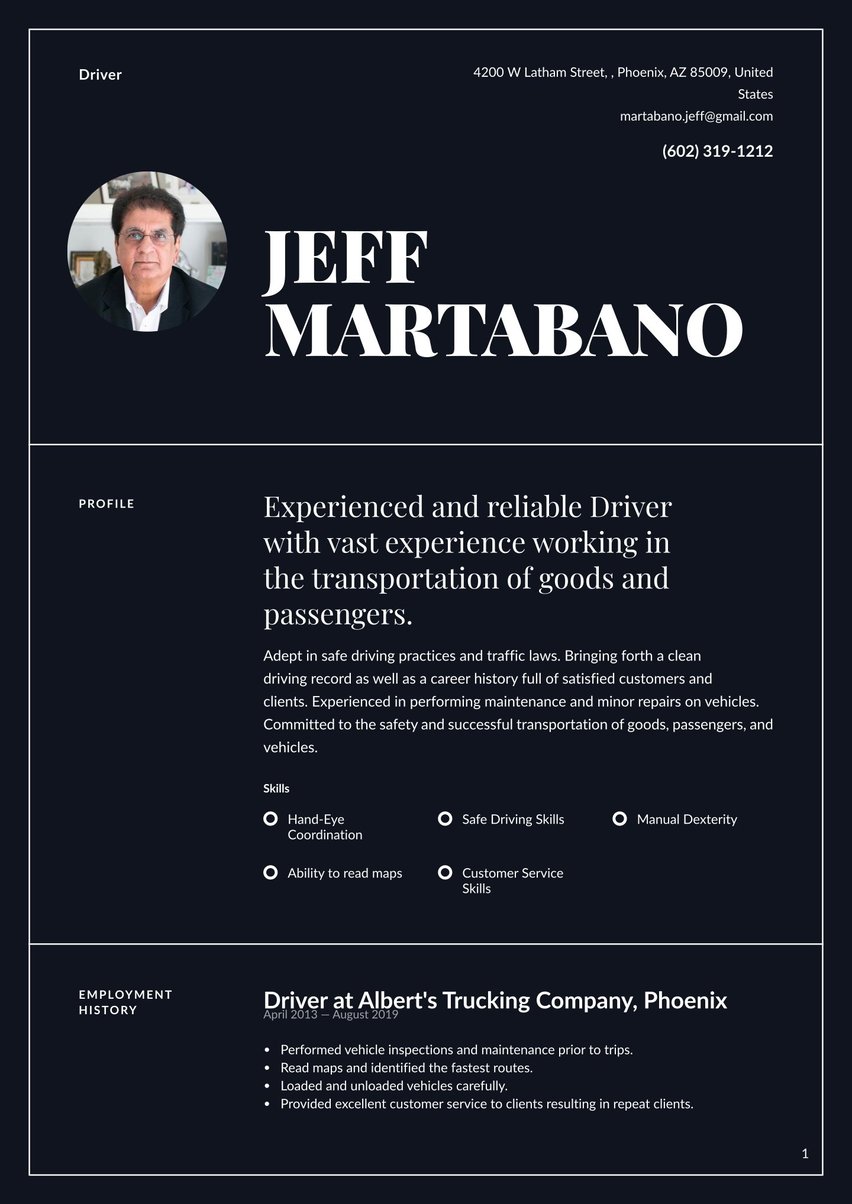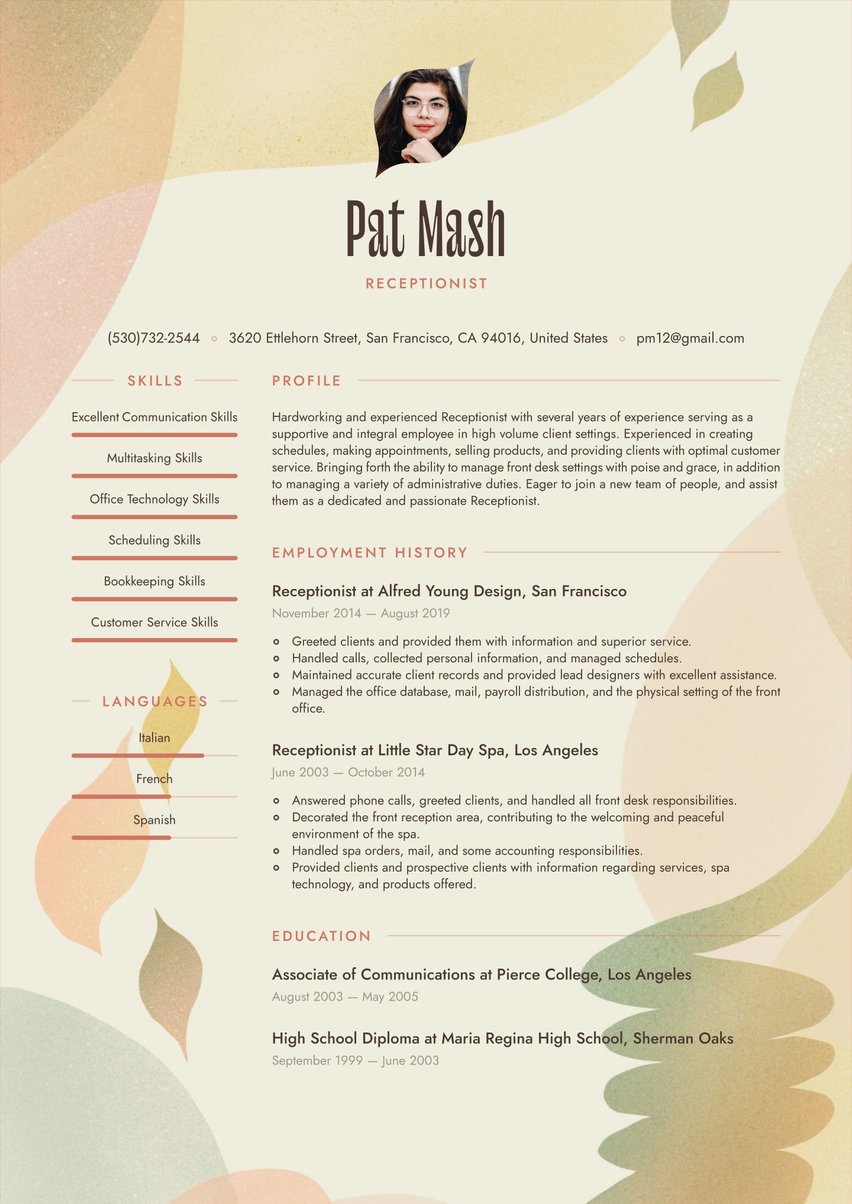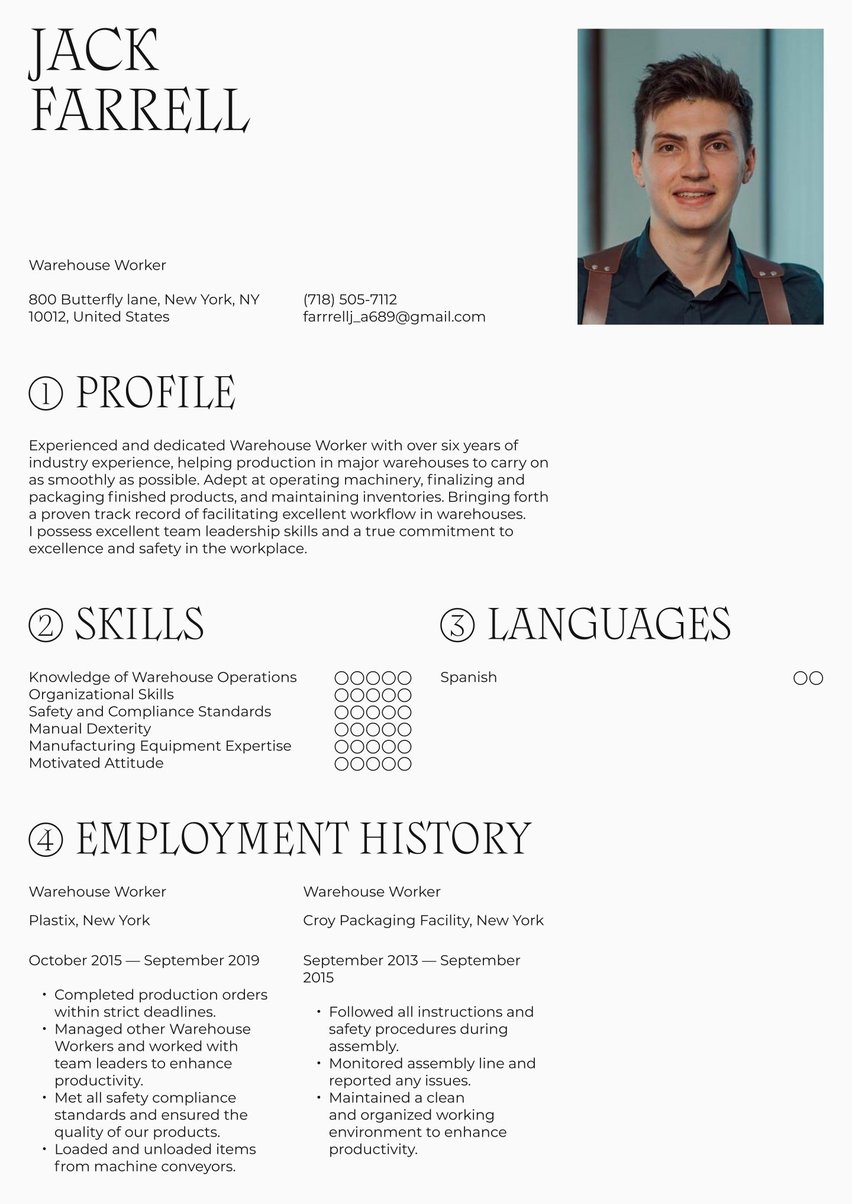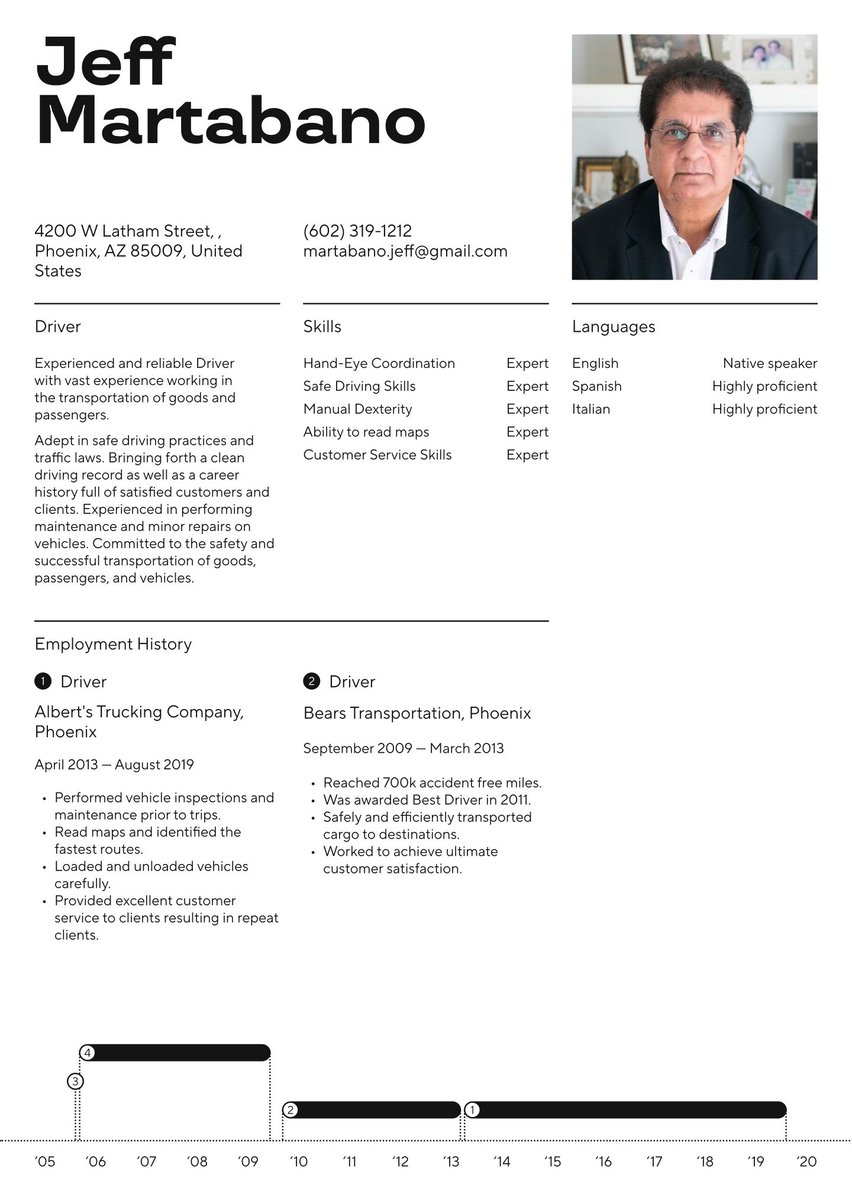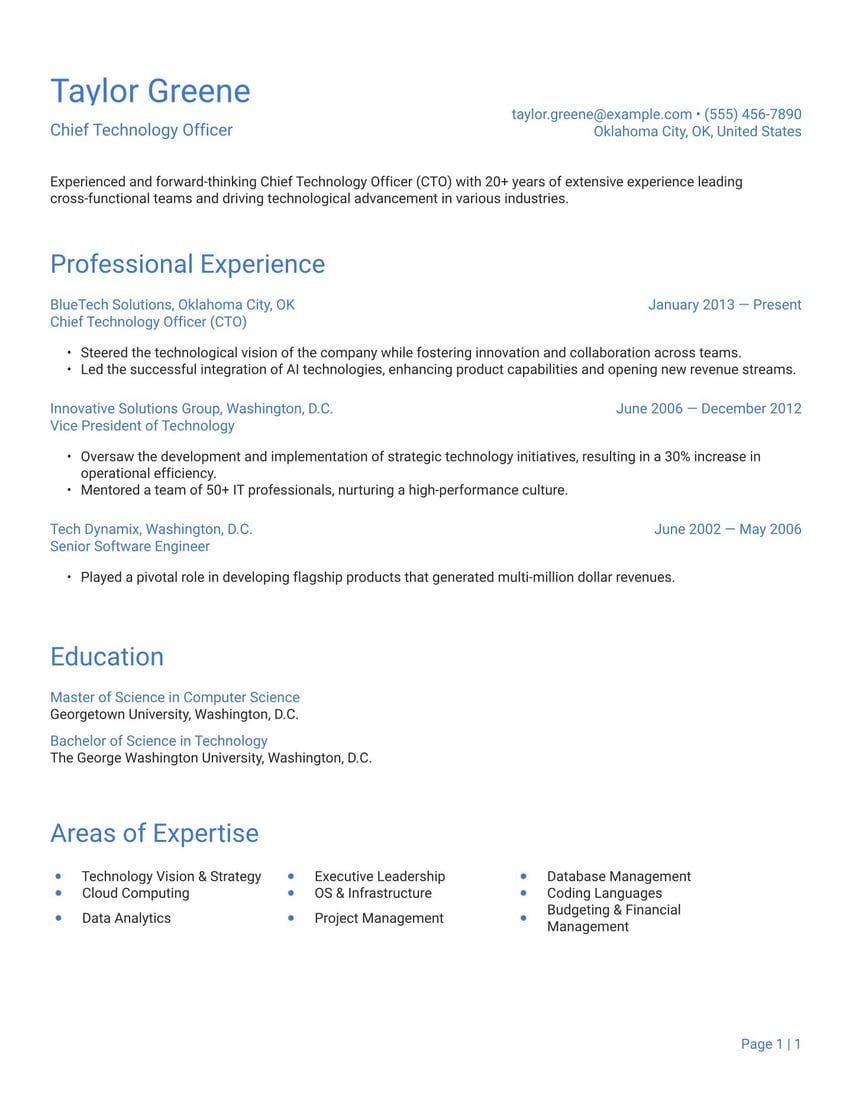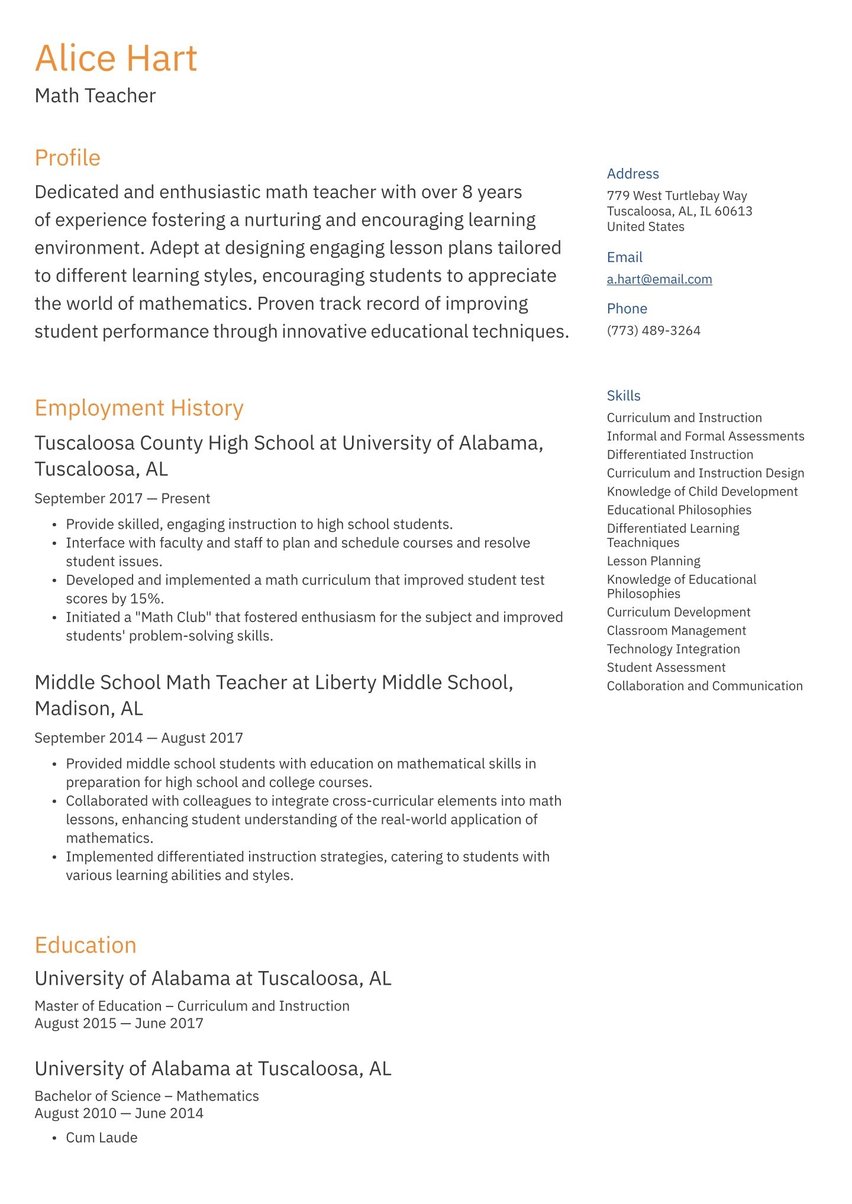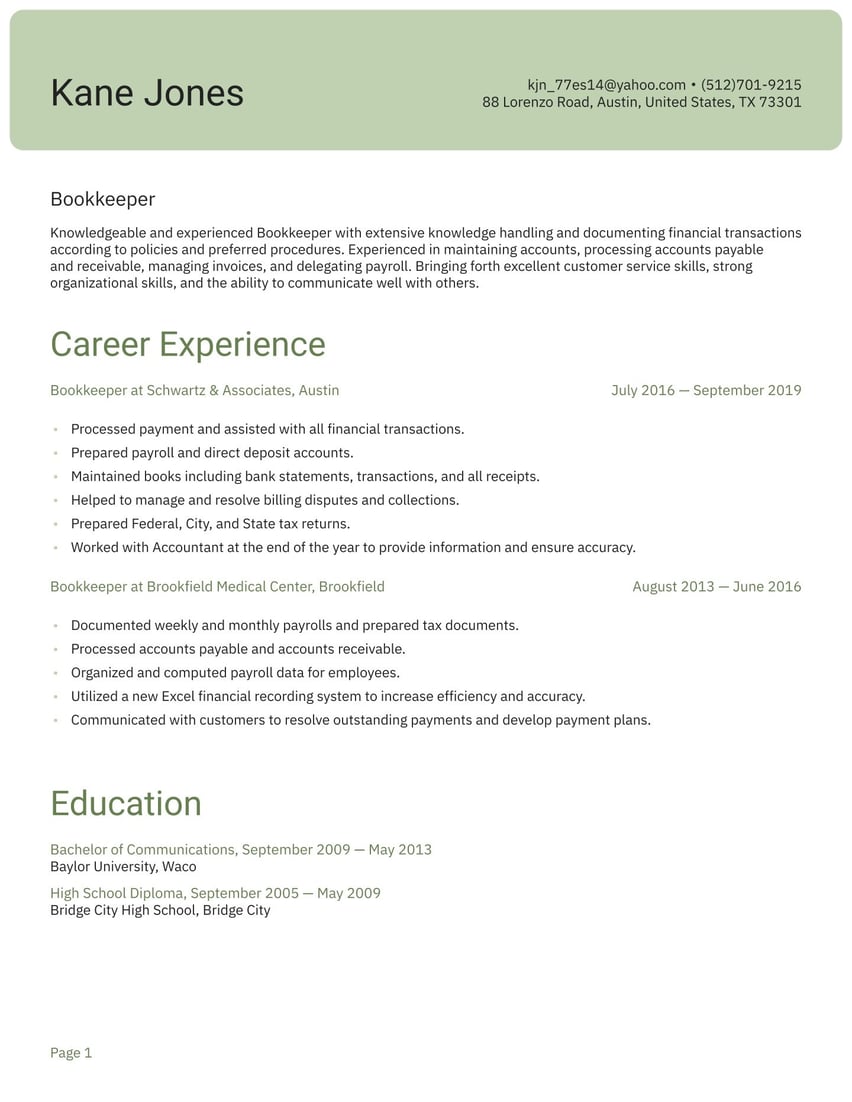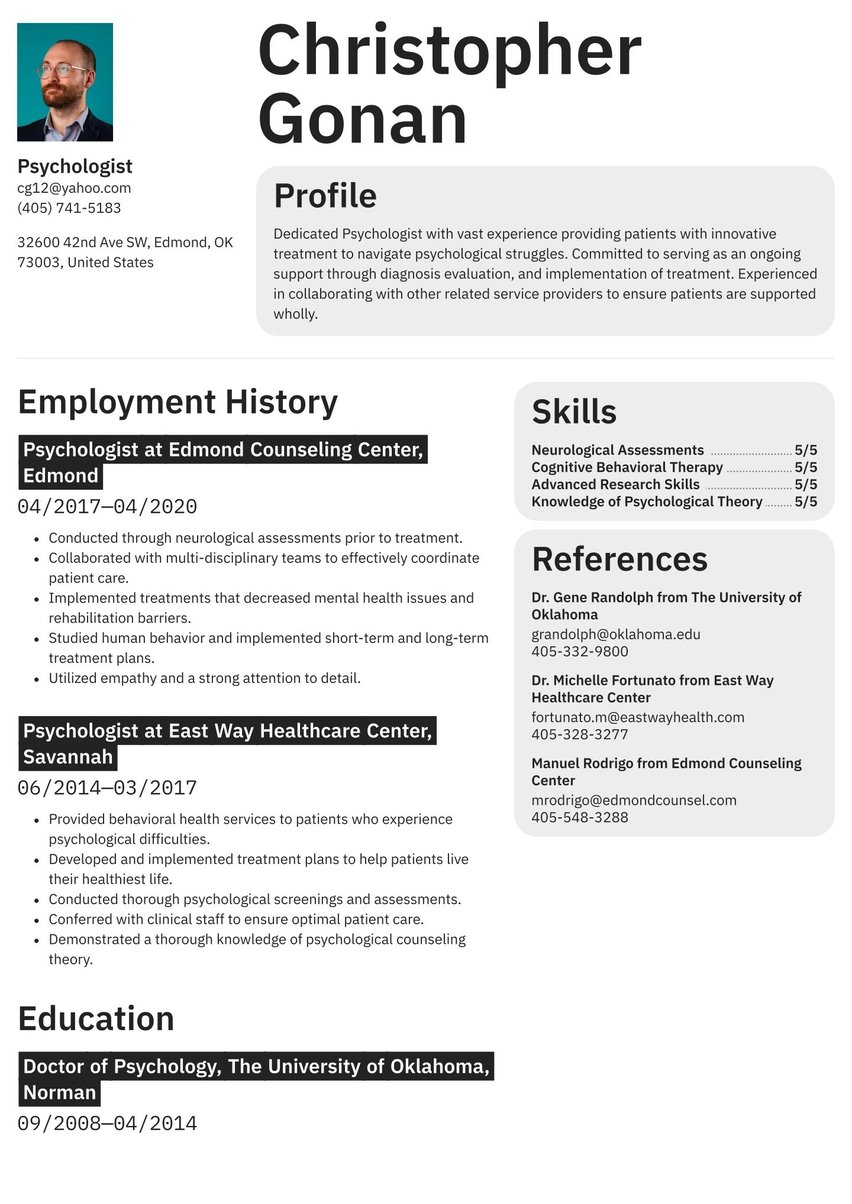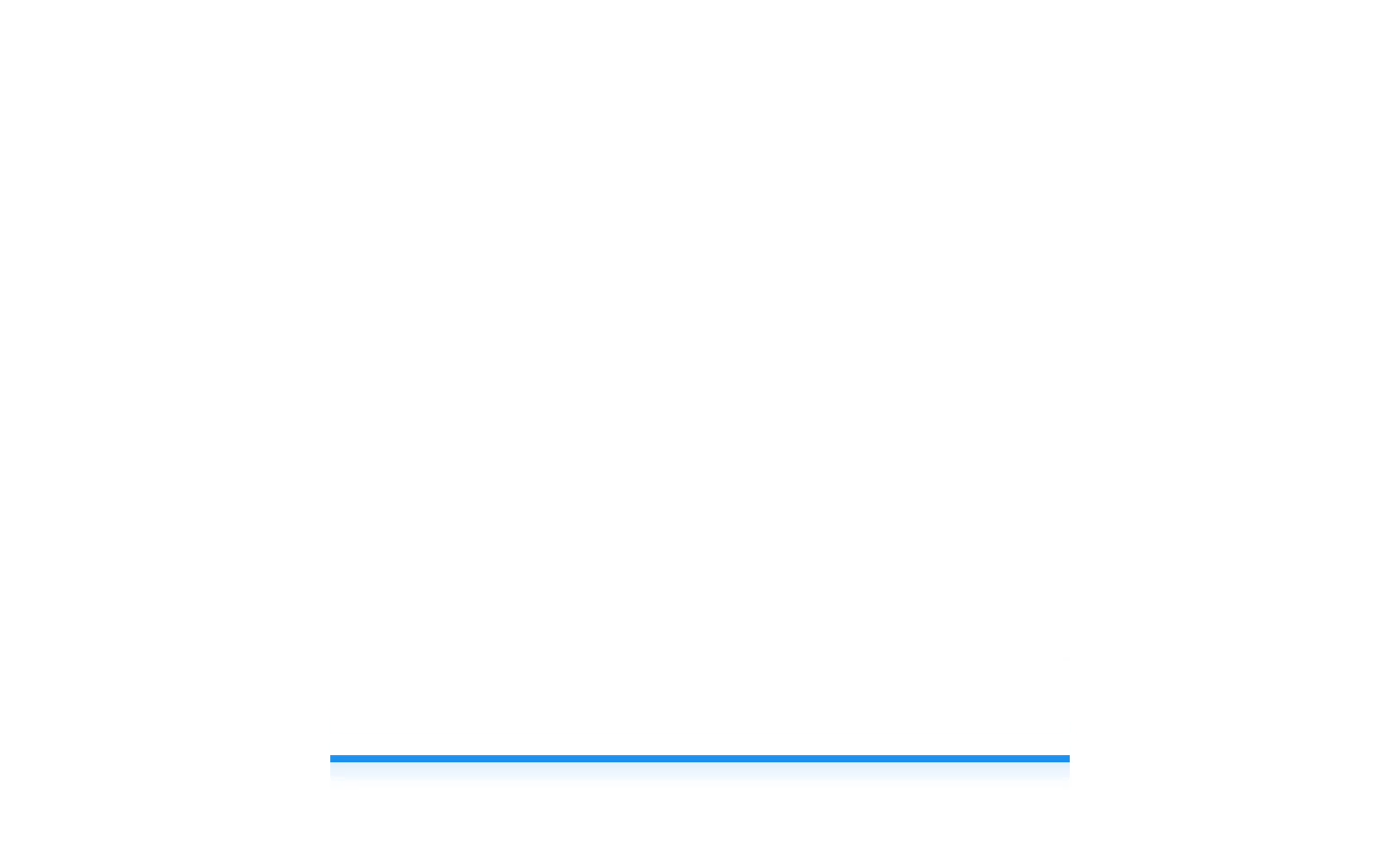With employees all over the world becoming enamored with remote work over the past few years, you may be considering a relocation. With proximity and a shared language, Canada is a compelling option for those looking to leave the US but not feel too far from home.
Canadian Resume Format resume examples by experience level
If you find the right type of job in Canada, it’s important to make sure you’re using the right Canadian resume format. The best Canadian resumes are not too dissimilar to those in the US. However, there are some key differences of which you should be aware.
Resume guide for a Canadian resume format
Increase your chances of success by building your Canadian resume with Resume.io. With guides and resume examples covering over 500 careers, plus a resume builder, we make it easier than ever to create an excellent resume, whether you’re seeking a US or Canadian format.
This resume guide and corresponding Canadian resume example will cover the following:
- How to write a resume using the right Canadian format
- Choosing the right resume structure
- How to add your contact information
- Using summaries or profiles
- Adding your relevant experience
- Listing your educational credentials
- Picking the right resume design/layout
- What the Canadian job market and salaries look like
How to write a Canadian resume
The first step to writing your Canadian resume is understanding what sections to include. Make sure your resume contains the following:
- The resume header
- The resume summary (aka profile or personal statement)
- The employment history section
- The resume skills section
- The education section
As we mentioned, there are some differences between resume formats in the US and Canada. The major ones to watch for are as follows:
- Language and spelling. A US resume will use American English, while Canadian resumes often use British English. Depending on the part of Canada, Canadian resumes may even be written in French.
- Data format. In the US, it’s customary to write dates as Month - Day - Year (e.g., May 5, 2024). In Canada, resumes should display the date using a Year - Month - Day.
- Resume length. Resumes in the US can be 1-2 pages in length, while Canadian resumes can be a bit longer especially if the writer has extensive work experience.
Even with these differences, there’s plenty in common. To set your resume up to land the job, keep these things in mind:
- Highlight accomplishments rather than responsibilities. Regardless of the country, the reader of your resume wants to understand what you achieved and how you made an impact.
- Just like you’re tailoring your resume to a new country, do the same for each employer. Adjust your content, tone, and style to be the most relevant.
- Use a resume template that suits the Canadian resume format and is easy to read.
- Optimize your resume with relevant keywords so it’s clear to the reader—or an applicant tracking system—how you’re the best fit.
Optimize for the ATS
An applicant tracking system is used by companies to collect and track all of their candidates and job applications. Some advanced systems use algorithms to scan and assess resumes based on how well they match up to the job posting.
To ensure the most success, review the job description for the most important keywords and ensure they’re well-reflected on your resume.
Choosing the right resume format for Canada
Just like in the US, reverse chronological is the best resume format. This puts the focus on your specific work history and experience, giving the hiring manager exactly what they are looking for. To use this format, simply display your work history from the most recent to the earliest.
If you’re light on work experience or making a major career change, you may find success with a functional format, which emphasizes your skills and traits over your specific work history. Or, try to merge the two formats into one that captures the best of both worlds.
Whichever you choose, you can see examples in action and check out different resume templates in our resume builder.
The best design for your resume will depend on the type of work you do. Sift through our modern, creative, professional, and simple versions to see which best suits your experience.
Include your contact information
Your resume’s header is important regardless of which format you use and in which country you’re searching. Without it, the reader won’t know how to get in touch to invite you for an interview. The header has a single goal: communicate your contact information.
There are a few items you should be sure to include in your Canadian resume header:
- Your full name & title. List your first and last name and the title of the role you are pursuing.
- A professional email address. Your email address should be professional, like [email protected], not silly or quirky.
- Your phone number. Include the phone number where you can most easily be reached, and make sure your voicemail is set up. Since you’re applying to a role in a new country, include your country code.
- Your current and future location. In general, you need only list your city and state. It’s best to avoid your full address for safety reasons, and a zip code won’t be relevant to a Canadian reader. However, since you’re looking to relocate, state “Willing to Relocate” or “Relocating to Canada” here.
- Your LinkedIn profile. If you have an active LinkedIn profile, include it here.
Don’t include:
- Date of birth: This isn’t necessary in the US or Canada, and could potentially lead to age discrimination.
- Personal details: Marital status, social security number, passport number, etc. can all be left off.
Sara Winchester
Sales Manager
+1 360-345-3275
Seattle, WA - Relocating to Vancouver, BC
Craft a compelling summary
A summary is the first part of your resume that will really grab the hiring manager’s attention. It’s where you get to pull together your experience, expertise, and enthusiasm for the role and craft a narrative. But don’t say too much—the summary should only be 2-4 sentences, so keep it light.
Don’t just reiterate your resume or use vague statements. Instead, use action verbs and specific achievements to show how you’re the best fit for the job at hand. For example, if you’re applying to a sales role, you might include something like, “High-achieving sales leader with a track record of exceeding quota five years in a row, while expanding into new territories.”
Imagine you’re in an elevator with the hiring manager and have just a few minutes to pitch yourself as the solution to their business problem. The summary is a written version of your elevator pitch.
Need inspiration for your summary? Check out our related resumes:
You can find an adaptable Canadian example summary below:
Experienced telemarketer with a proven track record of achieving sales targets and building strong customer relationships. Skilled in lead generation, cold calling, and customer service. Proficient in using various telemarketing software and CRM tools. Committed to delivering exceptional results and contributing to company growth.
Outline your work experience
If you’re using the reverse chronological format, list your current or most recent job first, then work your way backwards. Only go back 10-15 years to keep the focus on the most recent and relevant work. Try to keep your experience related to the job you’re applying to; if you have unrelated experience that you feel strongly about including, you can create an “other experience” section.
List your company, title, and dates of work (being mindful of Canadian date conventions). Underneath each job, use concise bullet points to describe your achievements and results. Just like with a US resume format, there’s no need to write complete sentences or use pronouns like “my” or “I.” Do, however, start each bullet point with a verb—delivered, innovated, accomplished, directed, sold, negotiated, led.
Don’t simply reiterate your role’s job description. Your resume should showcase how you made a unique impact in the position, not just detail the tasks you were assigned. For example, you can imagine an administrative assistant resume with bullets like:
- "Assisted with administrative tasks.”
- "Helped the boss manage his calendar.”
- “Ordered office supplies.”
While those are all accurate to an administrative assistant job, nothing about them stands out or proves how the writer is the best candidate for the job. And if you’re applying to a job in an entirely new country, especially if you require relocation assistance, you’ve got to pull out all the stops to set yourself apart as the very best.
That’s where results come in. Shoot for each bullet point to include a specific metric, result, or impact. When you do this, it transforms your resume:
- "Owned all administrative tasks for a busy law firm, including booking 5 travel arrangements per month, achieving 100% accurate data entry, and greeting all visitors.”
- "Coordinated and managed executive’s schedule, including daily calendaring and complex scheduling of 10+ meetings per week.”
- “Managed office supply inventory and ordering for office of 50, ensuring adequate stock and timely replacements as needed.”
Now, that looks like someone you want to hire!
Take a look at the Canadian employment history resume sample below:
Senior Telemarketer at ABC Industries, Ottawa, ON
November 2018 - Present
- Consistently exceed monthly sales targets by an average of 25% through effective lead generation and cold calling techniques.
- Develop and maintain a deep understanding of company products and services to provide tailored solutions to customers.
- Collaborate with the sales team to identify cross-selling and upselling opportunities, resulting in a 15% increase in average order value.
- Train and mentor new telemarketing staff, fostering a culture of continuous learning and improvement.
Telemarketer at XYZ Corporation, Ottawa, ON
July 2016 - October 2018
- Conducted outbound calls to potential customers, generating leads and setting appointments for the sales team.
- Achieved a 95% customer satisfaction rate by actively listening to customer needs and providing appropriate solutions.
- Maintained accurate and up-to-date records in the CRM system, ensuring data integrity and facilitating effective follow-up.
- Participated in regular training sessions to stay updated on product knowledge and sales techniques.
How to write a Canadian resume with no experience
If you don’t have direct work experience for the role intended with your Canadian resume, you can still shoot your shot at the job. By focusing on your transferable skills and any relevant education, you can show yourself as an excellent fit even without exact experience doing the job.
What information you include will depend on the sort of job you’re targeting. If you’re seeking a role as a software engineer, for instance, you might include your bachelor’s in computer science, previous internships, and any side projects you’ve done on your own.
If you’re looking to break into sales, you might include experience working as a server in a restaurant and honing your communication and interpersonal skills.
Include the key skills that make you a great employee
Just like in the US, your Canadian resume should display your top skills in the skills section. List both your hard and soft skills to paint a comprehensive picture of your abilities.
Hard skills are those that can be demonstrated and assessed, like expertise with a specific software system or knowledge of a project management methodology.
Soft skills, on the other hand, are those that pertain to interpersonal or intrinsic abilities like customer service, communication skills, or strong time management skills.
Resume.io’s resume builder includes several skills from which to choose, and you also have the option to add your own.
Here’s what the skills box looks like in our Canadian resume template.
Key Skills and Proficiencies
However, the skills section is just one place to show your expertise. You should also display your skills throughout your resume, especially in the summary and work experience sections.
For example, consider highlight things like:
- Role-related experience by describing past accomplishments and expertise in similar positions
- Interpersonal skills by detailing the role you’ve played on a team or as a leader, or how you’ve provided excellent customer service
- Ability to learn quickly by sharing an example of something you had to learn and how you quickly got up to speed
Whatever the role, the job description is the best place to look as you determine the most important skills to include.
Detail your education & relevant certifications
In general, your resume’s education section is fairly straightforward. Just like with your work history, you’ll list your educational experience in reverse chronological order, including the institution name, the degree or certification you earned, and — if within the past five years — the date achieved.
If you have a university degree or higher, there’s no need to include high school information. But formal education isn’t the only thing to include here. You can also incorporate the following:
- Training and certifications. If you’ve taken any certificate programs, courses, workshops, or even highly relevant webinars, they can be added here.
- Internships or apprenticeships. If you gained on-the-job experience and training through an internship, apprenticeship, or similar, that can be shared in the education section.
- Professional development or affiliations. Are you a member of a trade association or industry group? This can show your passion for the industry as well as your commitment to staying aware of trends and changes in your field.
- Language skills. This may only be relevant if you’re applying in a French-speaking part of Canada, but if you’ve taken courses to brush up on your French, it can help to include that.
Associate of Science in Business Administration, University of Ottawa, Ottawa, ON
August 2014 - May 2016
Pick the right resume layout and design for a Canadian resume
The design and layout of your resume has a big impact on the hiring manager’s first impression, so you want to get it right. It should grab the attention of the reader, be simple to understand, and be representative of your professionalism.
A great layout contains ample whitespace, clean lines, and limited color and fonts. While it’s fine to show a little personality with a pop of color or a modern font, don’t go overboard.
Although there’s no shortcut to a perfect resume, if you’re searching for a free Canadian resume format template, check out our field-tested resume templates. We take care of the hardest part for you, helping your skills to shine.
Canadian text-only resume example
Profile
Experienced telemarketer with a proven track record of achieving sales targets and building strong customer relationships. Skilled in lead generation, cold calling, and customer service. Proficient in using various telemarketing software and CRM tools. Committed to delivering exceptional results and contributing to company growth.
Employment history
Senior Telemarketer at ABC Industries, Ottawa, ON
November 2018 - Present
- Consistently exceed monthly sales targets by an average of 25% through effective lead generation and cold calling techniques.
- Develop and maintain a deep understanding of company products and services to provide tailored solutions to customers.
- Collaborate with the sales team to identify cross-selling and upselling opportunities, resulting in a 15% increase in average order value.
- Train and mentor new telemarketing staff, fostering a culture of continuous learning and improvement.
Telemarketer at XYZ Corporation, Ottawa, ON
July 2016 - October 2018
- Conducted outbound calls to potential customers, generating leads and setting appointments for the sales team.
- Achieved a 95% customer satisfaction rate by actively listening to customer needs and providing appropriate solutions.
- Maintained accurate and up-to-date records in the CRM system, ensuring data integrity and facilitating effective follow-up.
- Participated in regular training sessions to stay updated on product knowledge and sales techniques.
Skills
- Computer Skills
- Customer Service
- Microsoft Excel
- Mentoring & Coaching
- Microsoft Office
- Cold-Calling
- Phone Etiquette
- Client Communication
- Cross-Selling & Upselling
Canadian job market and outlook
Overall, the job market in Canada is in flux just like that in the US. Unemployment is higher than that of the US, but the country is seeing increases in work within sectors like healthcare, natural resources, food services, and professional, scientific, and technical services.
- Canada’s unemployment rate is approximately 6.1%.
- The working population in Canada tops out at 21,721,000.
- There are approximately 678,475 job vacancies throughout Canada.
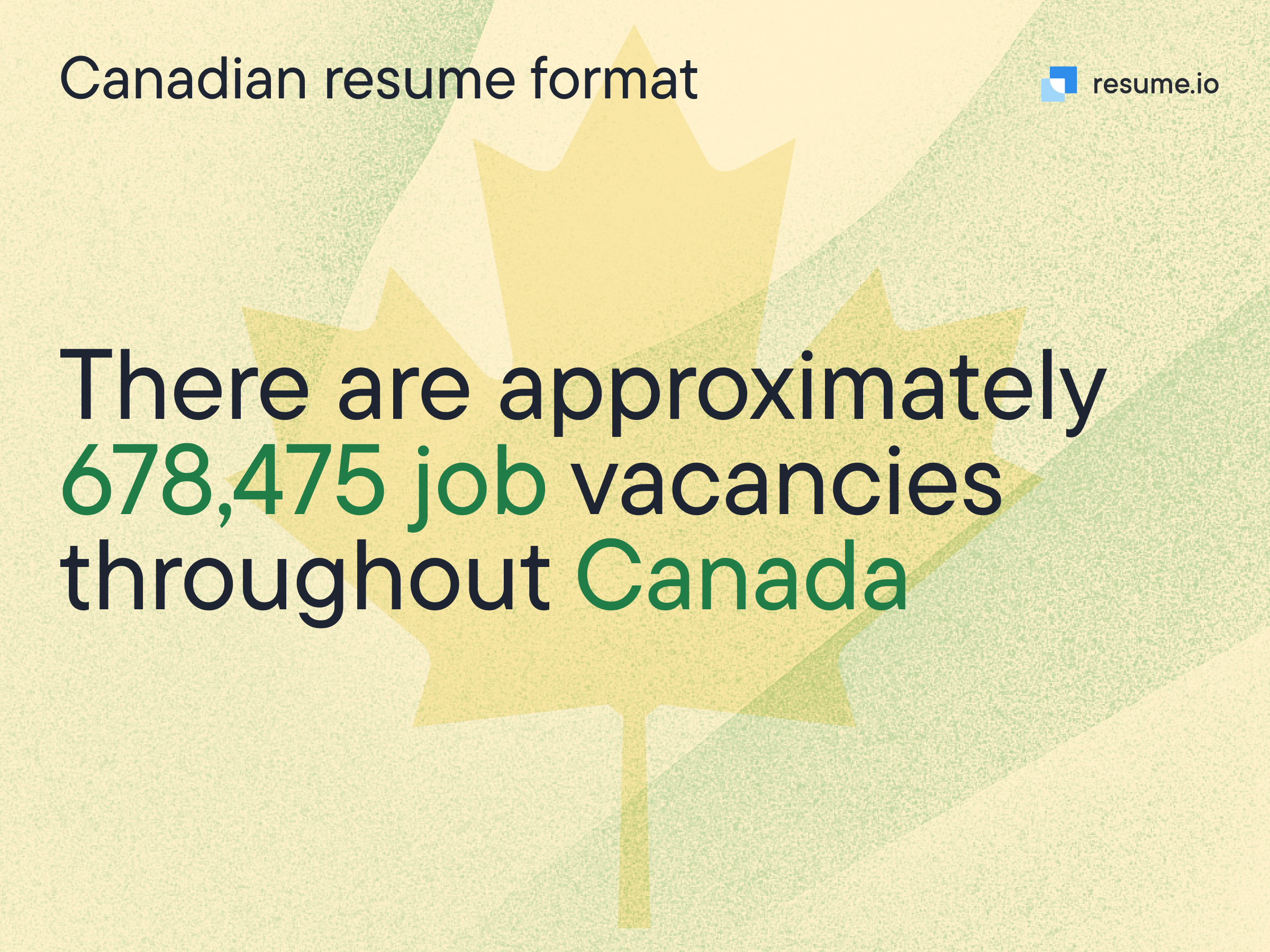
What type of salary you can expect in Canada
How much a professional will earn in Canada depends on the type of role, just like in any other location. Some of the highest-paying professions include medical roles like surgeon, physician, or psychologist; first responder work such as firefighter or police officer; and technical roles like data scientist or engineer.
It’s also the case that average salaries are similar between the US and Canada, but one must factor in the cost of living and how it can impact their overall take-home pay.
Taking all roles into consideration, the average weekly earnings in Canada range from $1,200 to $1,305 per week ($62,400 to $67,860 per year).
Key takeaways for building a Canadian resume
Canada offers plenty of opportunities for those looking to leave the US and experience a new country while not straying far from the comforts of home. For your best chances at a job, you need the best Canadian resume format and content.
Luckily, the differences between resumes meant for the US or Canada are slight, so most of your current resume can stay the same with some minor tweaks. Be sure to focus on achievements, top skills, and relevant education for the most success.
Our online resume builder can help you streamline the process, land an interview, and win the job. Happy trails!


.jpg)

.jpg)
